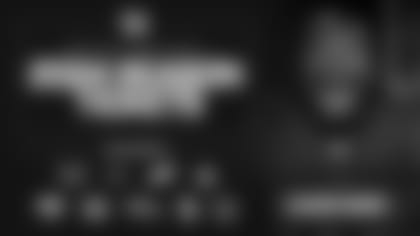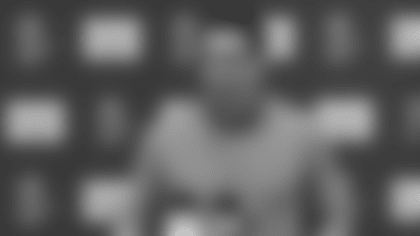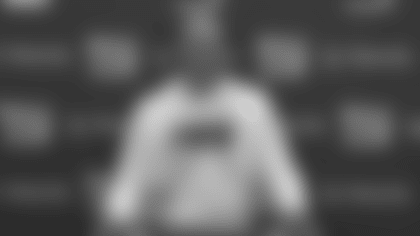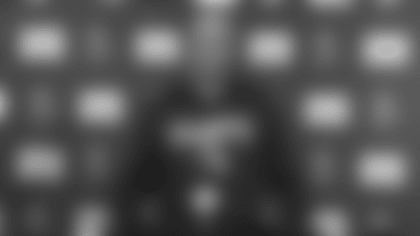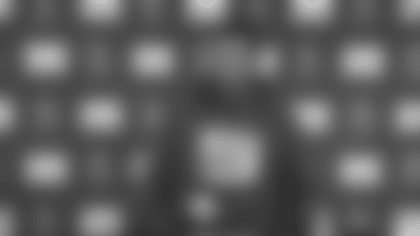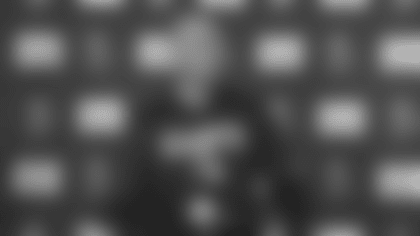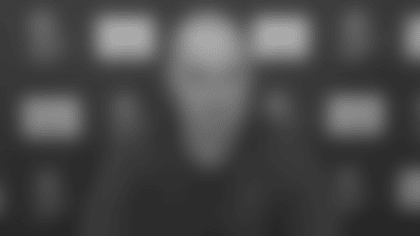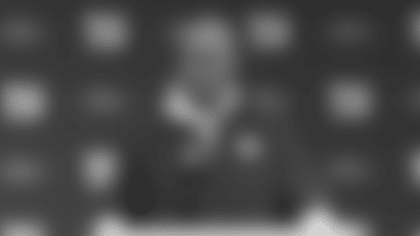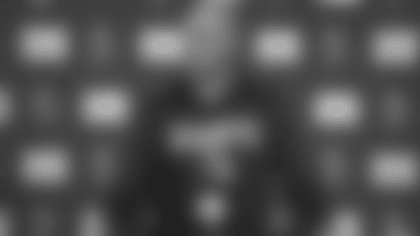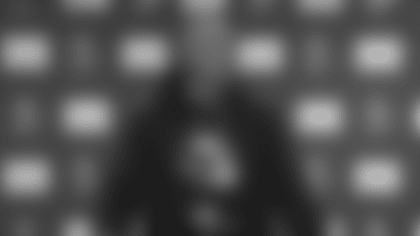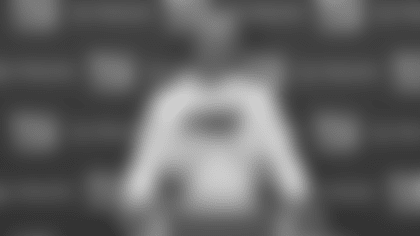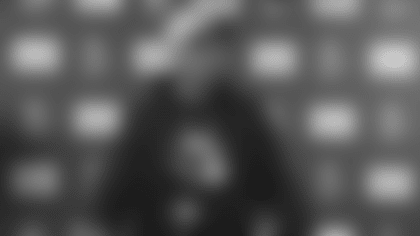Head Coach Brian Daboll
Q. You always say how early it is when we ask you certain things. Obviously you sometimes say it's only April. Well it is April 15th. This is the start of something.
BRIAN DABOLL: Sure.
Q. What do you feel this is the start of? Is it first day of school? Do you give these guys a message? Do you just kind of say hello, catch up, and let them go do the weight training and things?
BRIAN DABOLL: It's the start of phase one, so what we had is a squad meeting today and talked a little bit about the expectations for phase one for this particular next two weeks.
I have strength and conditioning speak. I have Dr. Lani (Lawrence), our mental doctor speak. I have Ronnie Barnes, head of the athletic training department, speak. I have (Ed) Triggs speak on kind of the rules of what's expected for these next two weeks.
So I have a bunch of departments I think are all important in terms of helping the players be the best they can be at this time of the year and make sure that if they have any questions, they can put a face with a name to get those answered.
So we're doing our job in terms of helping them in this first phase.
I have some of the new players stand up, introduce themselves. Some of the new staff members introduce themselves. So it's really just an introduction meeting to the phase one portion of the off-season program. That's where we are at. It's good to see the turnout that we've had.
Q. You pleased with the turnout?
BRIAN DABOLL: Yeah. Yeah. Yes. Very good turnout.
Q. I know you evaluate the quarterback class every year in the draft. 2018, you were part of a really extensive search. What did you take from that experience that you have been able to apply to the process you've gone through this pre-draft?
BRIAN DABOLL: Yeah, I did that then. I did it in 2010, '11, I think. Again, when you're evaluating that position, you know, you could spend hours upon hours talking to those guys that play that spot.
So Joe has had some familiarity with it. We just do our due diligence. Done it other years, too. Not just this year. It's important to try to get a feel for that position because you never know when they'll be available.
You get a chance to meet and interact with them and develop a relationship, I'll call it, for a couple weeks, maybe a month, but you never know how that's going to develop down the line, too.
So we spent a lot of time in that '18 year of doing a lot of the different things, as you do, whether it's schematics or players, whatever it may be. You're always trying to evolve.
It's been a good process, but it's been a good process with a lot of the other positions too we've been looking at, which is pretty much all of them. It's been between the visits and out on the road, our coaches and scouts have done a really good job of trying to cross every T and dot every I to get prepared for what's going to happen in a couple weeks.
Q. Where does Daniel Jones stand in his rehab process? Is he able to be on the field today throwing passes?
BRIAN DABOLL: Yeah, no, it's day one of phase one. He's making progress. I don't want to say further ahead or behind. He's doing everything we need him to do, hitting it head on and making strides.
Q. Obviously you said phase one and you're bringing in Aaron Wellman and hired a new strength and conditioning coach. From your perspective, how much do you, before this comes up, work with them in terms of what their plans are? How important is it for them to get all the players together here today? We know the issues in the past you guys talked about at the end of the season. Joe Schoen made a point about how you felt as though there was a correlation between on-field and what the players have off the field in terms of injury prevention and stuff like that.
BRIAN DABOLL: Yeah, they've done -- some of the other new coaches have been very, very pleased of the things they've presented, how they want to do things, what they think can be better; been very easy to work with.
Have learned a good amount from those guys as well in terms of what they think is important, not just developing the core strength and the quickness, but the type of things they'll do with the players. They got up and spoke today in the team meeting, Aaron did, Frank (Piraino), and then the guys we retained from last year that were here.
But we've met, I've met with them quite a bit as you do to get ready for this particular phase one. I've met with them often about their structure, how they see things. We've done some different things to the weight room and improved some things in there I think. They've been getting after it all morning, which is good to see.
Those two guys heading up that area have done a great job for the couple months they've been here.
Q. Anything you can point to that might be the biggest noticeable change for players that come in? Is it approach?
BRIAN DABOLL: There is a little turf area in the weight room. The whole weight room is different. There is a different vibe in there. There's some things we can do a little bit more in there for them.
We've met here in the morning. There are out there working out right now. We'll get feedback and make sure we're trying to do everything we can do to help them be the best they can be.
Q. The turf for movement in the weight room?
BRIAN DABOLL: Yeah, there's a little turf -- the weight room is set up a little bit differently, the configuration of it, trying to maximize our space and give those guys everything they need to perform their jobs.
So credit to the ownership for doing those type of things for the strength coaches and Joe. You know, it's a good start. Good to get everybody back in the building. I know that. There is a good vibe.
Q. Certainly not going to ask attendance about every single player there, but given Darren Waller's unique circumstances, is he there today? What are your expectations for him through the voluntary program? He said recently he's treating the end of OTAs as his deadline. Do you expect him for phase one, phase two?
BRIAN DABOLL: Understand the question completely; have nothing to add on that from what Joe talked about a couple weeks ago in the ownership meeting. You know, again, I just go back to our attendance. Was very happy and pleased with our attendance.
In terms of Darren's specific situation, I'm going to keep that in-house and nothing to add at this time.
Q. Joe had mentioned, I think it was actually at the combine, that Daniel could possibly get into drills at some point in the spring. How much is that your expectation? And what are you expecting him to do or be able to do this spring?
BRIAN DABOLL: Appreciate the question. It's day to day with these injuries. It's come in and be improved from where you were the day before, and I don't think too far ahead with that. He's been in meetings, rehabbing, doing his stuff.
Tomorrow we'll see if we can do a little bit more and next day build off that. More of a day to day proposition for us. What's going to happen two weeks, four weeks, I couldn't give that you answer right now.
Q. With with your playbook, how different is your defensive playbook, one, and even on the offensive side, obviously you guys go back there and --
BRIAN DABOLL: Sure.
Q. Mike Kafka said we come up with new things. How much change is there to the playbook that you give new guys now this year for the offensive side?
BRIAN DABOLL: Yeah, sure. Every year there is change, whether it's personnel, scheme things, coaches, staff members. That's the NFL.
So certainly there is some changes within the offense. Defense is obviously a little bit different with a new coordinator. Same with special teams. Again, it's day one. Those guys will have an opportunity. We'll build up slowly in the next two weeks to get ready for phase two.
That's really the goal for phase one is to get them in here, get the physical stuff going. That's where I want them to spend most of their time in terms of weight room and with the strength coaches.
You do have a little bit of time to meet individually. That will be split up with groups, position groups with the position coaches. But there is a lot to learn. There always is every year, regardless if someone is here or not.
Q. I guess in two weeks we have a draft. I'm just wondering, how much time is there in a day for you now? You have the OTAs going on. Probably deep into the draft thought.
BRIAN DABOLL: Sure.
Q. How much time do you have to spend on both?
BRIAN DABOLL: Significant. Yeah, there is the process of getting ready for this type of setting, phase one, and making sure that's organized. You you spend a lot of time, you got a lot of catching up to do. Season ends, you start to evaluate, whether it's your roster, things you need to do better.
Free agents that are going to become available in the league. You get to the college deal, and our college scouts have done a fantastic job. They have the three years I've been here, leaded up by Joe and Brandon (Brown) and (Dennis) Hickey. So you're trying to catch up to – you're never going to fully catch up to them. They've been on the road and seen them in person, done a lot of things. Their work is really invaluable.
Then you start evaluating players and meet with them and maybe going on trips. Our coaches have been out a lot this spring evaluating guys, whether it's private workouts and pro days. And that's the way it's been the last couple years. It's part of the off-season. It's a good part of the off-season, but there is definitely things that you were behind on and you got to try and catch up on.
That's what we're trying to do.
Q. The mock drafts all seem that the quarterbacks go one, two three; Giants take whichever receiver is left. Is it that simple?
BRIAN DABOLL: I don't know. I think you could go back the last ten years and look at all the mock drafts and see where everything was before the draft and then after the draft. I got a great appreciation for everybody that puts time in, whether they are in the building or outside the building and people that evaluate players. It's time consuming. Those people that put those things together do a great job.
I would say you never really know until you're right in the moment of the day of the draft. Unless a trade happens before the draft. There is a lot of unknowns, a lot of uncertainties. You do the best job to prepare for it, and Joe has done a great job the last two years. He's doing a great job of leading the staff and the meetings they have.
You know, you just have a great appreciation for the work that people put into it, whether it's in our building or outside the building. It's time consuming.
You might see something different than I see. Not that it's wrong, but that's just the way it goes. The mock drafts, I look at them. I definitely look at them because there is probably some people that are communicating with other people and they think this and they think that.
I don't know if a mock draft has ever been 100% in terms of one, two, three, four, five, six, seven, eight, nine, ten, so you trust your work of your evaluation, the people in your building, and then make the best decision for yourself.
Q. You've been the sort of new guy in the building once or twice in your career. What are Shane (Bowen) and Michael (Ghobrial) doing today? How important is it for them to set a tone for what they hope to do for their units?
BRIAN DABOLL: Yeah, really, it's an introductory meeting for the players. We don't play for a long time. We're really focused on kind of this phase of what we're trying to get accomplished. I don't think you can get too far down the road.
There is many, many months before that happens. I think meeting the players, being around them, letting them know about how they want to do things in the meetings and splitting it up with the position coaches. Obviously we have a lot of position coaches on the defensive side that were here before. Shane will go ahead and get up. I think his meeting starts at 10:30 today and he's in there right now with the guys and going through some things.
Really, it's an introduction to him, to the new coaches, to some of the philosophies and things that he's looking for in terms of meetings and things like that.
Same thing with Ghobs. Ghobs will meet with the guys. The whole team, he wanted to meet with the whole team to talk about special teams so that will be tomorrow for him.
Q. Do you find that you see a different side to your coaches? You've been working with them for a couple months now?
BRIAN DABOLL: Sure.
Q. Once the players get in the building, does that change a coach's personality?
BRIAN DABOLL: No, but it's a great day to have the players back. It's just you as a coaching staff and other staff members and a lot of people have been out, but it starts feeling like football a little bit, albeit four, five months away, but to have the players in and see them in the hallway, lunchroom, to interact with them, I think all the coaches are excited about the start of phase one.
Q. With Devin Singletary coming in, I'm interested to know what did you like about him as player during your time in Buffalo that made him a good fit here, and how has he grown or changed as player since then?
BRIAN DABOLL: He's been a durable player, whether it was when I was in Buffalo, last year at Houston. He is smart. He handles his responsibilties like a pro. He's got good quickness and vision. He's had a level of production every year that's been pretty consistent. He's a consistent person, he's a consistent player. I'm happy we have him.
He's got good leadership traits. He's been a good player for us when I was at Buffalo. He did a great job I thought last year at Houston. Thought he would be a good piece to add to not just our running back room, but to the offense and team in general.
Q. I know you're always talking about evolving the program, yourself, the players. You've had obviously year one was successful; last year was a little bit bumpy. Speak about the lessons you pulled from the first two years and how you expect to change and evolve the program going forward, including yourself.
BRIAN DABOLL: Yeah, that could be -- that's a long one. Great question. Look, you always self-assess for the program and for yourself and for your coaches and for the players.
That's something that you do every year, and you spend quite a bit of time doing it. That's right when the season ends, going into the evaluations, and then you sit there and talk about schematic evaluations, and that takes a long time.
And then you're talking about organizational structure and things you want to change or monitor based on scheduling, based on what you can do to help the players be more available.
That goes into phase one, phase two, how do we want to do this a little differently, what did we like from it, what are the new ideas being brought in? Goes right into the training camp aspect of it after the -- and even the OTAs. We spend a lot of time on that relative to -- there is a certain time frame that have to do it in, but how you move things around, we discuss that.
When to condition. When not to condition. How to do a certain drill. Maybe it's an up-tempo drill on one day and you cut it back a little bit more where last you're you did up-tempo, up-tempo, up-tempo. You're really looking at every aspect of it. Training camp, where did we stay, why did we stay there. Was it the right thing. The vehicles from training camp.
The details in everything we do in every department. You lean on the people in those departments that are responsible for those departments as well. You can give them direction, which is the job of a leader, is to give them direction, and then make sure that they're doing their job the way that they need to do their job to be successful.
So the communication aspect of that. That's always improving. I think it's important when you're at that seat, you know, sitting in that head coach, you have a lot of things coming your way. That's the nature of the position.
Again, fortunately I've had 28 years, this will be 24 years in the NFL. Seeing it from a different perspective the last two years as a head coach. But when someone comes into your room you have so many things on your plate and you're trying to do this. You've got to take a deep breath and make sure when they're in your room that's the most important thing to them. They wouldn't come in your room for any other reason. You've got to take a deep breath and make sure you become a really good listener in that regard.
Q. Have you found it hard to make changes and to adapt? You obviously do things a certain way for a number of years and if they don't work, do you find it hard to adapt?
BRIAN DABOLL: No, I think look, you're always adapting and adjusting. You have to, when you're a position coach, coordinator, obviously when you're a head coach. Look, we understand it's a results business, but there is a process to it, too. There is a process that I strongly believe in. Year one, there was a process. The process gave you these results. Year two there was another process. Not really different from year one too much. Some little changes that gave you other results.
Was it the process or what? Like, that's what you are always evaluating. What can you do with that to try to yield different results. It's a competitive, tough industry. Each year is a different year and we're focused on this year. We're excited to be back and it's been good to see everybody back in the building.
Assistant Head Coach/Offensive Coordinator Mike Kafka
Q. Mike, can you just talk a little bit about you have a new title added to your offensive coordinator title. Just what that means to you, what different responsibilities you have, and what discussions have you had with Brian as far as calling the plays on offense this season?
MIKE KAFKA: Yeah, so it's certainly an honor to have that title. I don't take it lightly. Some of the responsibilities I've done with Dabs and going through the off-season, number one kind of being a part a little bit more of the interview process. We've hired some new coaches, some new staff around the building.
So being a part of that, how the inner workings of those decisions happen.
And then sitting in on building out this off-season. So sitting in on the planning, listening to our health department work through our injured guys and their progress and how they are going to build that into our off-season program. That's been really cool to be a part of really the backbone on how we're going to do this thing.
Q. What about the playcalling? You came back. Obviously something I assume you want to do. Where are you with that?
MIKE KAFKA: Yeah, every year is different. You got to go through the evaluation process, and this year is no different. It's day one of phase one, so there is a long time to go. But I'm excited and I'm excited in my role and doing whatever we can do to get better each day.
Q. Congratulations on your promotion.
MIKE KAFKA: Thank you.
Q. Curious about something. When you have a quarterback like Daniel Jones' injury history, I know that you can't coach scared. You have to plan accordingly. But that being said, he is coming off the ACL, two neck injuries. How much does that type of injury history factor into how you construct the offense moving forward?
MIKE KAFKA: Listen, Daniel is a tough kid, and I know he's going through all his rehab right now and attacking that thing. It's been cool. I see him in here every single day working his butt off to get right.
When you talk about one specific person on offense, it's never about just one specific person. It's an 11-man operation. You've got to take into account everyone's ability and where everyone is at, and then you try to build an offense around all the players and playmakers that you have.
That's what we're doing right now. We've really dug into that this off-season as a staff. As we continue to go through this process, we just finished up free agency, going into the draft, adding some players there as well, it's going to be an ongoing process until we get to training camp and into the season.
Q. In terms of Daniel, his running ability is a big part of what you have done in the past. Do you maybe look to shift some of that away from him while he's recovering or until you have a better feel for how well he's going to respond in those situations?
MIKE KAFKA: Yeah, we'll just have open lines of communication with Daniel and all the players. You want to be able to gauge all of them. We'll see where they are and see what his comfortability is on those, and put together a game plan on offense that we really feel good about.
Q. What is it like to know that you won't have Saquon Barkley?
MIKE KAFKA: Well, first and foremost, Saquon is a hell of a player, a hell of a person. I was very lucky to be around him for the couple years. I wish him nothing but the best.
I think where we are right now, we are at day one. We have a lot of new players that have come in. We're trying get introductions and get them into our program and how we want to run our offense and start from -- build it from day one on and create trust and create some energy within the offense.
So these new guys are coming in and some of the guys last year as well, they're building on that. So we got a lot on this right now as an offense that we're working through. Saquon was great for us and he's a great player. Again, wish him nothing but the best.
Right now we're moving on to what we have to get accomplished, and that's getting our guys together and working towards our goals.
Q. What's it like to be the one coordinator who is still with the Giants?
MIKE KAFKA: I haven't really thought about that. I'm lucky and happy to be here. Looking forward to getting after it this off-season.
Q. Paul asked you about expectations for playcalling going forward, but we haven't talked to you since the end of the season. What was your reaction to the time it got taken away from you last year?
MIKE KAFKA: Yeah, I don't know if that's been out there or anything. All I know is last year is last year. There's a lot of things we need to get better at, from coaches, players, everybody. We just got to improve.
So I'm not going to go too far into the past. I put that in my rearview. We've learned from it, we've grown from it, and we're really excited about phase one, and today is the first day of the start.
Q. Different gears, you obviously were there in Kansas City and worked closely with Mahomes his rookie year. What did you learn from that development process that if you're in that position with a rookie quarterback that you would apply?
MIKE KAFKA: Yeah, you have to have a sense of urgency, but there is also a sense of urgency in learning, helping him teach and having him learn the offense and learn how to be a pro.
But you also have to have some patience with that as well and understand that whoever that player is, doesn't have to be just quarterback. Really any rookie. You try and give them bite-sized pieces they can really hold and take with them and now you can continue to build on those lessons.
There will be some opportunities for growth. You take that, you build on it and just keep stacking each and every day.
That's how you really get to your end goal.
Q. I know last year was last year, but when you look at the offense as a whole and what you guys went through, when you look at this year, what are some of your key points you look at and say you know what, these are things we have to change in order to be better than last year?
MIKE KAFKA: It's really an ongoing process. You look at we have to be able to protect the quarterback better, we have to be able to create more explosive plays, run the football better.
There are some fundamental technique things we need to get cleaned up. There is a lot, and those are just a few to name off the top of my head.
I really believe we're in a good spot as a staff. We're in a good spot mentally. Talking with the guys today, we've been in meetings for about an hour and a half, seeing their energy and attentiveness to go and learn the system. It's going to be an exciting off-season.
Q. I know you said you're happy to be here and anxious to get going. A lot of speculation, and I know you don't want to look backwards, but how would you describe your relationship with Dabs right now?
MIKE KAFKA: Yeah, no, I love working with Dabs, I love working for Dabs. It's been a collaborative process. Have we got all the results we wanted each and every day, sure we want to go win every single game, but sometimes that doesn't happen.
We go through the ups and downs of a season and we're all competitive, we all want to win. That's what I love about him.
Q. You mentioned protection. You made a lot of the additions to the O-line this off-season. What do you make of those and your early plans for how that will shake out?
MIKE KAFKA: Yeah, so Carm (Carmen Bricillo), our new offensive line coach, we have great room and a great influx of some new players and veteran players, and so we're going to take the veteran guys we have, the young guys we have, and continue to develop them and just continue to build in that room.
I'm excited for that room. Carm comes from a similar system, so there is some terminology that carries over so we were able to get through this process a little bit quicker than if it was a coach that didn't have as much of a background as he has.
We're excited. Carm's doing a hell of a job and they're ready to roll. I spent all morning in what O-line room.
Q. What did you see in there today?
MIKE KAFKA: Just energy. Just felt it. Guys asking great questions, creating the dialogue we're looking for and coming together as a group. Five guys playing as one.
Q. After you interviewed with Seattle to be their head coach, they also requested an interview with you to be their offensive coordinator. Why do you think the Seahawks thought you were interested in a lateral move, and were you interested in making a lateral move to somebody else's OC?
MIKE KAFKA: I must've did a good job. No, it was a great opportunity there. I love the people there. Jody, John, it was a great experience. But that's what it was, it was a great experience and I can carry that over into the future.
Q. So were you interested in lateral moves or only in the Giants OC job?
MIKE KAFKA: No. I'm here and I'm excited to be here with the Giants.
Q. What do you make of this year's top whatever it would be, first round we'll call it, what do you make of this year's first round quarterback class?
MIKE KAFKA: Yeah, they are all a little bit different. I like the class. Smart guys. We have been able to meet them throughout the combine process, throughout this pre-draft process. Really sharp guys with a lot of the ability, so I'm really excited about this group. It's been cool.
Q. You've been a player. Is that an awkward situation with Daniel? Do you have to address with him as somebody who spends a lot time with him, hey, we're looking at quarterbacks, or do you just ignore the elephant in the room?
MIKE KAFKA: We look at every position every season, every year, every draft. You are looking every group. Every year, you're looking at quarterbacks, running backs, tight ends, O-linemen. Where can you find a way to make your team better, your offense better.
I know in my role I'm evaluating these guys and giving all my information that I can to Joe and his staff and Dabs so they can make the best decision for the team.
So I think -- and I'm not going to speak for Daniel -- but I think any time you go into player acquisition, you try it find the best player or best person for the job.
Q. I'm curious, what do you look for? What's important for you when you do go through that quarterback process? I know a lot of people need to see them throw the -- some coaches say I need to hear them throw. When you go through that what's important to you?
MIKE KAFKA: There is a lot of things that are important to me in a quarterback. You know, leadership, just that ability to kind of control a room, control a huddle. That kind of "it" factor. You look for that. The more you talk to them the more you get comfortable with them.
A lot of times it's -- the first time you meet somebody it's like maybe one of the other parties may not be as comfortable, so you try to have these exposures with guys so you can really understand how they tick.
You want to understand what fires them up and what things maybe give them issues so you have a plan as a coach to build a guy up and how you can kind of prevent maybe some weak spots. If they have a weakness and I have a strength, I can cover up his weakness with my strength and vice versa.
You try to find that "it" factor with a guy you want to be around that you know is going to make the other guys better around him. Whether it's the quarterback room or another position, some guys just have that. I know we have that already in our quarterback room with Daniel, with Drew, with Tommy. Those are guys that command and do a hell of a job in the huddle and command the leadership of the team.
Those are guys you want to be around.
Q. I know you said you didn't want to rehash last year. Offensively it was a tough year for you guys, especially the first half. What did you learn about yourself as a coach during that time?
MIKE KAFKA: Yeah, resiliency. It's never easy. The players feel that too. The players, they are the ones between the lines working it out. So as a coach, we're all in this together. You want to continue to communicate, you want to continue to try and solve problems whenever they come up.
So what I am most proud of from that whole thing is how the players responded the last half of the season when we had a bunch of injuries really throughout, couple different quarterbacks, different players jumping in different roles.
I was really proud to see those guys step up and dig down deep and pull out some wins for us. That was really cool to see and be a part of. Although it wasn't the results we wanted, it's something we can learn from and grow from and have a better year this year.
Defensive Coordinator Shane Bowen
Q. Shane Bowen defense, you know, we saw it in Tennessee obviously. What at the end of the day do you want the Shane Bowen New York Giants defense, when people say that, what are they going to see on the field?
SHANE BOWEN: Yeah, I hope they see us flying around, playing with speed, playing with great effort. I think a physicality to our game, playing with violence. Attacking the line of scrimmage. Guys being fundamentally sound. Not beating ourselves. Making sure we are lined up, we are communicating, doing everything pre-snap that we need to do to put ourselves in position to make plays.
Ultimately if guys fly around and we play physical, I feel like that makes up for a lot of stuff.
Q. What's your sense of familiarity with this roster right now? Obviously it's day one with the players and how much work do you have to do to figure out these guys?
SHANE BOWEN: Yeah, spring is going to be huge for that. Just talking to them this morning. It's a clean slate for a lot of guys. Everybody is going to get opportunities. We are going to do some different things, put people in some different places than they might have been at times. I mean, I'm familiar. I've watched all the film from last season, so I have an idea, strengths, weaknesses, areas I think we need to improve, players need to improve specifically. But that will kind of continue throughout the spring.
Q. When you come in and take over as coordinator, how much of it -- of what you do is, this is my defense, compared to these guys do this well, I don't want to change them.
SHANE BOWEN: Yeah, that's a good question. Ultimately as a coach in my opinion, you've got to put the players you have in the best situations for them to be successful, right.
So we have our scheme, our systematic thinking of what we want to do defensively. But at the same time, we've got to be able to adjust; I think great coaching staffs always do. You've got to be able to adjust to who you have. So you're putting those guys in positions that are favorable to them and not putting them in positions that they might struggle in.
Q. Just to sort of piggyback on that, they ran a pretty unique scheme for a couple years. For returning players, how much of an adjustment do you think it will be to transition into what you're going to run?
SHANE BOWEN: Yeah, there's some similarities. There are. Obviously Wink (Martindale) took over for Dean (Pees) in Baltimore. I took over for Dean in Tennessee. So there's some terminology aspects that are going to be similar.
I mean, you guys know the stats, just in terms of blitz rate, what it was here compared to what we were in Tennessee.
Ultimately we are going to do what we need to do to win. I think the biggest thing for me right now is getting a good handle on these guys and introducing from the ground -- ground level all the way up through making sure we are understanding the style of play we want to play with, first and foremost, and then as we get into X's and O's and kind of evolve, and I get a better feel for those guys, that will kind of take on a life of its own as we go.
Q. And then just kind of for my purposes, in the past, we knew what the prototypes were for certain positions. Curious at cornerback, what are you looking for? What are the traits, size, measurables that you are looking for at that position?
SHANE BOWEN: I want guys that can defend the deep part of the field, guys that can play man coverage and guys that are willing to tackle.
Obviously measurables are great, but if they are able to get their job done with being a little bit less than some of those measurables, then I'm okay with that. But those are the big three for me.
Q. First of all, just what was kind of your reaction to the Brian Burns trade and kind of the process as that played out?
SHANE BOWEN: Yeah, I'm excited to have him here. I am. Just getting him in the building today. Obviously he's had success in this league. He's been an impact player in this league.
So I'm excited to get him here and we'll work kind of throughout the spring and see where he's at and just like all these other guys, we've got things for him that he can improve on and things that he's got to continue to do as a high level. But really excited to add him.
Q. How much do you expect the front, the defensive line and the front seven to be a strength and how important is that given the history of this franchise?
SHANE BOWEN: Yeah, I hope. I hope it's a big strength for us. We've got guys up there. We've got resources up there. And those guys, I'm expecting big things from them and we are going to demand big things from them. Hopefully they can play off each other. I think they complement each other in terms of what they do well and in terms of rush coordination and things that come into play with that. But I'm going to have high standards for that group.
Q. I can't really ignore the elephant in the room; that it didn't end well here for your predecessor. What kind of work did you do -- investigation did you do into that into how you would be able to get along with Brian Daboll? Obviously I don't think you've worked with him but Vrabel has, right, and you probably have a lot of similar connections. What kind of research did you do before taking this job?
SHANE BOWEN: I met with Dabs throughout the interview process and got a feel for who he was and obviously everybody is pretty connected throughout this league. So you have an idea.
Everything has been great. It's been really, really encouraging being here these past two months, working with him and I'm excited for where this thing is going to go in the future.
Q. Obviously you kept a lot of the former position coaches. What went into that? Obviously like you know a lot of defensive coordinators want to pick their whole staff. Why were you okay with keeping some of the guys that were already here, did you interview them or was that kind of an understood process in taking the job?
SHANE BOWEN: Yeah, I think all the guys that were retained are really good coaches. I think they are really great at connecting with their players. They have had those relationships and that's such a big piece in coaching. Probably the most important piece in coaching is the relationship side of this business.
I always say, these players don't care what you know until they know how much you care, right. So I think that was a big part of it for me is just their familiarity, their relationships already in place with these players. Got a great feel for all those guys. What we're trying to do, I feel like they are in line with. They are in sync. They have got great ideas.
So I'm really happy we were able to retain them. And I think it's going to be a benefit for me, not only early on getting a feel for these players and how things operate and how they operate from a day-to-day basis, but also moving forward, really, with all these relationships.
Q. What's it like to inherit a player like a Dexter Lawrence?
SHANE BOWEN: It's good. It's good. I'm excited. I'm excited to coach him. I am. He's a proven player in this league. I think the thing is just the continued leadership that comes with his success. Continue to push the envelope in terms of that. But in terms of the play, what he brings out there on Sunday, from what I understand from what he brings day-in and day-out here, I'm excited to have the opportunity to coach him and what he can bring to our defense.
Q. Will your players have to unlearn some of what they spent the last seasons doing under Wink because of the different concepts?
SHANE BOWEN: I don't know if I would say unlearn. They will take some of that, what they have learned. The biggest thing to me is probably terminology, right. Everybody does a lot of the same stuff, has a lot of the same scheme and system in their systems. It's really just a terminology -- and even me learning as I've kind of progressed through it. How can I relate to what we are calling this now so what we called it before, right.
So more or less, I think it's more so that. Because playing football is playing football. The technique, the fundamentals, all that is going to be pretty similar I think throughout schemes. Mainly the terminology.
Q. I'm wondering how you go about coaching the new hip drop tackle rules. Obviously you're not going to be able to do it live too much in practices and things like that. How do you attack that change?
SHANE BOWEN: Yeah, we are in the process of studying it now. I think just bringing awareness to it. Understand that the biggest thing for me is the situations guys find themselves in when they occur, right. Like if we have a good understanding of that, I think that will lead to hopefully us being able to avoid it. I don't know if it's going to be a hundred percent avoidable at times. I hope it is. But at times, you're going to be caught in some situations, and those guys, they are going to do whatever they can to get the guy down on the ground. It might happen.
But right now, we are studying them. We are trying to make cutups of them where we can show the guys just so they have a good understanding of in this situation when you're in this body position with the ball carrier, these are when these things are showing up, and then we have got to be able to teach from that to where we can eliminate getting ourselves in those situations.
Q. If I could follow up on a different angle. Isaiah Simmons is a guy that you guys brought back. Didn't have to, right. So obviously you have some kind of a vision for him. What is that vision? Where do you see him fitting in in your scheme?
SHANE BOWEN: Yeah, I'm excited he decided to come back. I'm excited we were able to get him back here. He's a unique skillset and I think it's a fine line for coaches. You see all the different, I guess, things he's able to do but you can't overload him.
We are going to have to work through the spring. Right now, I couldn't give you a definite answer. I really couldn't. I think some of that is going to depend on some of these other positions and how things play out. He's played outside. He's played deep. He's played inside. I think the versatility to play man coverage is a big asset. The versatility to blitz. We are going to work through that this spring and hopefully get him in a spot he feels most comfortable where he can be most productive for us.
Q. I'm curious, when you went through the evaluation of what is on the roster, what stood out to you?
SHANE BOWEN: Yeah, I think obviously now, I think the front. Probably the main thing that stood out to me throughout was the depth. I think we have really good depth here. I think there's a bunch of guys that have played a lot of football here. I'm looking forward to seeing some of those guys compete for possibly a bigger role here this spring as we kind of get through practice and get into OTAs.
But that would probably be the biggest thing. I think we've got good players at all levels. I think we have impact players at all levels. So I'm very encouraged with what we have right now.
Q. I think when people say, okay, what is Shane Bowen's defense, a lot of people are like, well, that's Vrabel's defense because I'm sure as a head coach he probably had some input. How different do you envision your defense being? You know, without Vrabel here, without his input, obviously I'm sure you'll bring a lot of the same things, but will it look different and how much?
SHANE BOWEN: Yeah, I think we're kind of working through that right now as a staff. Just what we want it to look like. We have an idea. There's going to be some things that we did in Tennessee over the years that I feel strongly in schematically-wise, and then just really getting a feel for these players as we go with what my comfort level, with what they are able to handle, how much we are putting on them. The last thing I want to do is have so much scheme we can't focus on our style of play, the technique, the fundamentals and paralyzing ourselves before the snap.
I want to make sure that when that center has his hand on the ball, we are lined up. We've got our cleats in the ground and we are ready to roll and attack and play ball and we are not overthinking out there.
Q. Just wondering if you can talk a little about Kayvon Thibodeaux, I know you have not really started working with him yet. I'm sure you've studied him on tape. What did you see from him and what do you think his ceiling is?
SHANE BOWEN: Yeah, he had a productive year last year. Our goal is to build on last season. I think the addition of Burns, having those guys be able to compete day-in and day-out is going to be big for him.
With any young player, and I know he's a little bit further along, but with any of these guys that are still kind of figuring it out, it's just this time of year is huge for them. The development, the technique, the fundamentals. Like we are going to drive that home to them and hopefully we can continue to get that same level of production and with some more technique, fundamentals that we are going to be coaching, we can get a little more out of them.
But again, we'll see. We'll see how the spring goes. We'll see where we are at come training camp and obviously once the season gets going, where things are. But I'm excited to have him here. I think he's a talented player who hopefully he's going to be an impact player for us.
Q. And then if I could just follow up on the pass rush concept here. There's obviously different ways you can generate a pass rush. What's your philosophy as far as do you like to do it from the front seven? Do you like to throw in exotic blitzes? Do you do a little bit of everything?
SHANE BOWEN: Yeah, I would say, I mean, if you go back and look at my time in Tennessee, it's been a lot of front pressure, right. Like the front four, being coordinated with their rush lanes, working together, finding ways to affect the quarterback and then being able to use that to be multiple on the back end, right, where you're not delegating a piece up front. But we have done the gamut. We have brought four; we have brought five; we have brought six. We've done some of the zone pressure stuff, overload stuff. So we have it all.
I think as we get a feel here into training camp andreally based on how we are feeling with the front and some of these other guys, how they can impact as rushers from the second level, all that stuff comes into play.
And really ultimately you're talking about how you want to delegate resources, right. Are you delegating them for the rush, or are you trying to delegate them for the back end and some of that comes into play how good you are in the back end with less or how good you are rushing the quarterback with a little bit less. That will evolve as we go but my history has been, if we've got four guys that can rush, we are going to let them go rush.
Q. Obviously you're going to be teaming something that's a little bit different than what these guys have learned in the past. How do you -- do you have to be aware of that and how do you go about building trust with these guys and building buy-in into what you're trying to teach?
SHANE BOWEN: Yeah, I mean, honestly, I think the approach is a little bit different. I don't think in terms of the teaching and the schematics, there's going to be a whole lot of difference. I think the approach day-to-day, week-to-week, in terms of our game plan, that might change a little bit.
But I don't think there's -- going back to the previous question, I don't think they are really going to have to unlearn anything. I think it's just going to be what we are emphasizing a little bit more, these guys understanding their piece in the defense, how it all works together, understanding concepts, being able to tie them in so we can do different things that are similar in a lot of ways, but there might be one or two variations here or there.
But the focus right now is on style of play, on fundamentals and as we get to scheme and we get going in that direction, I think they will be able to pull a lot from what they have done in the past and then if there's some new things here or there, we'll teach them, right. We'll teach them.
But ultimately for me I think it's more of a general approach from my standpoint than anything.
Q. You mentioned earlier the blitz percentages. We all know them and we all know what the Giants did last year but philosophically, it's almost like people wants to use those percentages and look at yours and say, well, we know Bowen is not going to blitz at all. I talked to people down in Tennessee and said that's not true. What do you say to that idea that you like to play passively on the back end and you're not going to bring guys on the blitz?
SHANE BOWEN: Yeah, I'm going to do whatever we've got to do to affect the quarterback and make sure the ball don't get thrown over our head. Whatever that is, however many guys we've got to send. However, I guess, less guys you can send and still get the same result, I think all that comes into play.
And it takes all 11. It does. Like I mentioned earlier, if you're bringing more to affect the quarterback, you've got less back there to help, right. If you have more back there to help in coverage, you've got less going to affect the quarterback.
So it takes all 11. It all ties together, the rush, the coverage, however you want to piece it together, I think depends a little bit on personnel, how you're able to affect with less, how you're able to affect with more versus how you're able to hold up in the back end.
So it's going to be fluid. Like we've done it all. We really have. The percentages might not show up, but you go back and find the ones that we did, it's probably going to look a lot similar to what is was here, a little bit more on a higher percentage than what we did in Tennessee.
Special Teams Coordinator Michael Ghobrial
Q. As you embark on this new journey of yours as a coordinator, you probably are confronting one of the most dramatic rules changes the league has seen. Are you excited by this like some of your special teams coordinator brethren and how much do you anticipate this spring and summer having to introduce this to your new players and do they have any idea what's coming with this new rule?
MICHAEL GHOBRIAL: Yeah, it's a great question. This game is ever-evolving, and as a coordinator, there's an instance where you have to try and stay ahead of all the rule changes and find out what are all the intricacies of what those provide, and this obviously is going to be some foreign territory, but for everybody across the league.
And I think the NFL has done a hell of a job in terms of taking out the speed and space of this play in terms of kickoff to keep guys healthier, which is a big deal, but ultimately bringing a play that was almost dissolving with all the touchbacks and the fair catches that you were seeing.
So it's exciting to see. It's exciting to game plan. It's exciting to kind of find the little nuances when it comes to that specific rule change. But when it comes down to it, I've always felt that every special teams play requires a certain level of effort, a certain level of technique and a certain level of violence. So those will be the foundational pieces of that rule change. And then obviously figuring out what is our best foot forward in terms of attacking that. We'll do that this spring.
Q. I know it's only the first day. Has any player come up to you and asked you and said, can you explain this to me because I don't really understand it?
MICHAEL GHOBRIAL: Yeah, no, it's -- like I said, it's foreign territory to a lot of people, and just in passing, there's a lot of questions. You know, it's just -- it's exciting when it comes down to it because it's so new, right, and your brain starts to go a million miles per hour because you're thinking of all the intricacies that go on in a specific play.
But when it's so different, you have so many questions about it, right, and how your brain, whatever way it works, you start to think of like, okay, could this be the advantage, could this be the advantage. Everybody has great ideas on it.
So you know, it's exciting but players have come up and you know they have been simple questions and to the best of my knowledge, I'm going to give them those answers.
Q. Along those same lines, talking to a lot of people when the rule was first approved, everybody made that jump to roster construction, and we all know special teams, you guys are always at the mercy of what's going on elsewhere on the roster. But for you, how much do you envision maybe personnel preferences changing because of the rule, and you know, there's been speculation about people may go small or faster or may take some of the bigger guys off, you have to be more prepared. How much research have you done and will continue to do to be able to construct the proper roster to have those guys be able to perform at that level?
MICHAEL GHOBRIAL: No, that's a great question. And I think when you look at the role special teams plays in general, you are trying to utilize your best 11, regardless of who it is. A lot of that deals with what you do defensively, what type of front you major in and also offensively, where you front-loaded in certain positions.
So when you look at that specifically, you're trying to think, okay, what is the best 11 I can get out there, and it's not necessarily hey, we are looking for more size players, hey, we are looking for more speed here or we can get small here because we can utilize - this guy's quick. We are trying to find out what our best 11 is, and then when we do that, we could obviously piece together what our kickoff team will look like, what our kickoff return team will look like.
But that's part of -- one of the first tasks I took when I took this job was I evaluated our roster, and you know, you kind of look at where guys fit into different spots. And then it will be another evaluation as we get -- go through spring and then in training camp. It's just going to be ever-evolving. Until we finalize our whole roster, it's going to be what is our best 11 out there.
Q. I guess this rule change made it easy for us to give us a theme for your first presser. I'm just curious, does it change the type of kick returner, like the speed or the size or just that type of player to actually be the guy back there returning the kickoffs now?
MICHAEL GHOBRIAL: Another great question. These, honestly, are all things that come up as you look through the rules, as you watch similar, you know, obviously similar things that happen in the XFL.
I think when you look at it globally, you know, those are the baddest dudes back there; the most dangerous guys with the ball in their hands. So there's a skill set that could be very productive for certain types of returns and there's another skill set that could be more productive for other types of returns.
Again it goes back to who is your best 11 and your returners are definitely part of that conversation. And you have to evolve your scheme. It's got to feature those guys, whether it's a guy that hits it a million miles per hour, or whether it's a jitterbug-type guy that can make you miss. I think both have relevance with this new rule change. It will be exciting to see what we've got.
Q. You talk about how it's new for players but you've obviously never coached this. What was your process? Did you reach out to people in the XFL? How did you get up to speed to be able to teach it to players?
MICHAEL GHOBRIAL: Yeah, no question. The rules are very similar to the old XFL kickoff and kickoff return, so there was a huge emphasis in terms of studying that.
I think ultimately when you start to look at something new like that, you relate it back to what you know as well and then you start to combine, okay, these are the similarities, these are the differences. Now, the rule is going to be different than the XFL.
So you know, obviously navigating through what those rule changes are going to be, and still trying to figure out what is your base philosophy. I mean, those things are going to be ongoing.
And then once you start to practice it, those are going to be new things that are going to come up. And you're going to be like, okay, this is a great way to do things, or I don't necessarily like the way this looks. Let's figure out how to do it that way.
Q. I'm just wondering if you've ever thought of being a teacher because it sounds like that there's going to be a heavy emphasis on that part of this. That if it were status quo, everyone knows the deal, now you're the expert in this new rule in terms of with your players, of course.
MICHAEL GHOBRIAL: That's so funny. So my dad was a teacher and my sister is a teacher. Now she's in administration. I've always felt that coaching is synonymous with teaching, and that's one of -- the forefront of my pillars in terms of being able to get our players to understand certain things is I have to find a great teaching progression for them.
So there are, you know, people in my family that have taught, and again, you're always trying to figure out, what is the best way you can relay information to your players and we deal with a variety of different learners, trying to learn your learners. Figure out what their strengths are, what their challenges are and ultimately get them to compete at the greatest level.
Q. Two questions for you. One you mentioned you evaluated the roster. Your thoughts on Gano and Gillan.
MICHAEL GHOBRIAL: I'm excited to work with both of them. You know, you have two veteran guys, Graham, who has played 15-plus years in this league who has obviously done it at a very high level; and Jamie who is coming off a really strong year. Both, I think, are elite in terms of NFL specialists.
So I'm excited to work with them. I know they have a lot of talent and it's going to be fun.
Q. Your process on joining this job, obviously there's only 32 special teams coordinators, and I'm sure you wanted any of them, but having been in New York with the Jets, obviously, I'm sure you know that there was a lot of talk about Brian Daboll being very hard on his assistant coaches. Was that something you welcomed? Was that something that gave you pause? How did you feel through the interview process about joining this staff?
MICHAEL GHOBRIAL: You know, honestly, I was a coordinator in college before, and then the opportunity to coordinate again was always going to be very exciting to me, especially at the pinnacle of our profession in the NFL.
When I was with the Jets, my focus was totally on being the best assistant special teams coach that I could be. So there wasn't necessarily any knowledge of anything outside or building, and it's no different here. I was so excited to get in front of Dabs and it's been so cool getting to know him and the staff. It's been a lot of fun just in terms of, you know, acclimating to those processes here, and it will be fun to work with these guys.
Q. Building off of the evaluation piece, what were your impressions of overall of the units coming in and what do you think is the ceiling of these units?
MICHAEL GHOBRIAL: So some of the things that I look for, you know, when I look at special teams players are instincts, toughness and football IQ. Those are three things that you kind of evaluate, whether it's different schemes or anything, you're trying to figure out, again, it goes back to putting your personnel in the best situation for them to have success.
So those are three things that I kind of look at and you start to categorize guys, players, into two special teams categories. That, to me, is interior core players and outer core players, if you just look at like interior punt, your guard tackle slots and PP, and then your outer core players are your gunners, your speed guys.
When I evaluated this roster, it was kind of like deciphering where guys fit in that mold, and then you start to look at what are guys' strengths, what are guys' challenges, how do we improve that, and also figure out what were the technique differences to where we can get guys acclimated to a new scheme, new technique and then ultimately be able to play at a high level.
Q. You've been around in the college ranks. You've spent a lot of time, of course, with the Jets, a couple of seasons there. Can you just talk a little bit about what you have learned throughout this journey to get to this point and how you're going to use that as your foundation now that you're at the next level?
MICHAEL GHOBRIAL: Yeah, it's so cool to be in this position. I'm truly grateful for the opportunity. But I understand an opportunity is not an outcome. And I think of, obviously, where my roots were in college to start and the road it took me to get to the NFL.
In all that process of all the different universities I coached at, being with the Jets, my main focus was always trying to better myself as a coach and as a teacher.
So that's always been the forefront of what I carried with my coaching philosophy. And it's so cool now to be in the NFL as a coordinator for the New York Giants. You know, I have a smile on my face when I say this is the New York Football Giants and it's a pretty cool moment to be able to say that.
But it's exciting. You learn different ways to do things, whether you're the guy in charge or not. You learn, you know being obviously what are the best moments of your teaching progression. Certain techniques that you really like. It's really a culmination of all those places that I've spent time at; a credit to all the players that I've encountered, and they are definitely part of this journey and ultimately have made me the coach that I am today.
Q. You're obviously not on the field at this point. You're just introducing yourself to these players. What is your process with players at this point? You don't have your 11. What's your process with players? What are you trying to learn about them at this point as you -- as you try to figure out who your guys are going to be?
MICHAEL GHOBRIAL: Yeah, it's a great question at this part of the year, you do have meetings, so you do get opportunities to teach your new schemes, your new techniques and the way I run my meetings is very interactive.
So I get to hear these guys talk, how they communicate things. Because a lot of it deals with how they see the play, how they see the technique and that I think is a forefront of how you teach everything once you get out to the grass. Before that I want to know exactly what they are seeing.
So it's going to be a lot of me learning how they learn. It's going to be me learning necessarily how they see certain schemes and certain techniques I'm teaching them and what questions they have. So it will be a good opportunity to get to know the personnel on our roster.
Quarterback Daniel Jones
Q. I guess I kind of start with the obvious. How are you doing in rehab and where do things stand?
DANIEL JONES: Rehab is going well. Making good progress. Coming along. Spent a lot of time with the (athletic) trainers here and strength staff, so feel like things are going well. I'm coming along well.
Q. I think Joe had talked about a little bit, (he) hopes for what you'll be able to do this spring. Where do you stand on being able to throw or activities on the field?
DANIEL JONES: Yeah, I've been throwing for quite some time now. Was throwing stationary pretty soon in the rehab process but have progressed and I'm throwing with movement and dropping, and kind of quarterback-specific drills. So that feels good. Coming along well.
Q. So then just to build on that, have they given you a target date when you think you can be fully cleared?
DANIEL JONES: Yeah, the plan is to be ready to go by training camp. That's when I'm shooting for and feel good about being ready.
Q. Any setbacks or anything? I know long, hard process. Anything like that, or all been smooth? How is it going?
DANIEL JONES: I haven't had any setbacks fortunately to this point. You know, it's a process and there are certainly better days and then days that you don't make as much progress.
Overall, it's been a good process with these guys, and lucky to have the training staff we have here with the Giants and the strength staff and feel lucky to be working with them. Been a good process. I've come along well and luckily no setbacks.
Q. I'm curious, is your rehab strictly the leg? Do you have to do anything with the neck? Is that something you still have to build up? Anything you have to worry about? When you go and train? How does that factor in, if at all?
DANIEL JONES: No, that's not a factor. My neck is 100% healthy. That was a stinger-type injury that's pretty common in football. That's calmed down and I feel good.
Q. Joe had mentioned the possibility of you getting into some stuff in the spring, some drills and stuff. Where do you stand on that?
DANIEL JONES: Yeah, I want to do as much as they'll let me do. That's the goal. I want to be smart and not do anything I can't do, but I'm -- that's my goal, is to be involved and participate in some of those drills here in the spring.
So obviously it'll correlate with my rehab and the progress I'm making as the trainers and the strength staff see it, so, yeah, that's the goal.
Q. Is it strange to look around, part A, and not have Saquon here? What was that like for you? If my math is correct, part B would be I think you're the longest-tenured Giant now. Can you believe that?
DANIEL JONES: Yeah, me and Dex. I guess I was a few minutes before Dex. It's different for sure not having Saquon around. You know, he was a great teammate, a great friend. Happy for him to get the contract. Unfortunately, we're going to have to play him. But that's the NFL. That's the way this works. I'm excited about the guys we got on the team.
Q. And then it doesn't really feel like that long ago that we were asking Eli this question, but now we're asking you this question: How would you feel if the Giants used their first-round pick on a quarterback, and have they looped you in at all to the possibility they might do that and bring in a challenger for your job?
DANIEL JONES: My focus is what I'm doing here with my rehab. Kind of the same thing with Saquon. You know, that's the nature of our business. It's a competitive league, so the best way to handle that I think is to focus on what I'm doing, focus on myself, and making sure that I'm, one, healthy, and then ready to play good football. So that's what I can control. That's what I can do to help myself and the team.
Q. How good are you at sensing things around you? Do you have a sense -- there is so much talk about quarterbacks and what they're going to do with you and contracts. Seems like the ink is still just drying on your contract and there are already ways to get out and all these other things. Do you have a sense from Dabs, Joe Schoen, anybody that, you know what, I think they might be looking to replace me, or this is still my team and offense? You have to concentrate on your rehab, but how is your sense and your antennaabout those things?
DANIEL JONES: I think you can get into trouble when you try to think too much about some of those things and how it all works out. Yeah, like your antenna for some of those dynamics and relationships. I'm just focused on what I'm doing, and that's my rehab, getting healthy, spending time with the guys, and making sure we're getting on the same page, and having the best spring we can. Like I said, be a better question for Joe and Dabs. I'm focused on what I have to do.
Q. If you feel you're healthy in summer in training camp, and you hope to be, going on into the season, do you feel like you're the best quarterback the Giants could have to start their season with?
DANIEL JONES: I do, yes.
Q. Wondering if having Mike Kafka back is a sense of security blanket, a coach you know well, and obviously a chance at some point in the off-season he could have left?
DANIEL JONES: It's great to have Kafka back. It's a compliment to him that he was sought after in some of those head coaching jobs. He's a great coach and I've enjoyed working with him, spending time with him, and building this offense. We understand there are areas we're all looking to improve, and looking forward to working with him, taking his coaching, and taking these steps. He's a smart guy, football guy, played quarterback in the NFL. You know, has seen it from a quarterback's perspective, so I've enjoyed working with him.
Q. With the injuries, have they worn on you? Have they given you a life lesson? Have you taken a positive somehow? How have you addressed the idea in your own mind that so many of these games unfortunately you've not been out there for?
DANIEL JONES: Yeah, I mean, it's an unfortunate part of the game. It's a physical game. Playing quarterback you're going to take hits. A lot of the hits are in the pocket where you're not moving or protecting yourself as much as you would be when you're running. It's all part of the game, it's an unfortunate part of it, but it's time to focus on little things and try to rehab the knee, but also find other areas of your game that you can focus on and still apply yourself to improving. You're always looking for those edges or a couple of things that you can take a step with. Yeah, it's a little bit different when you're rehabbing and when you're maybe less -- at least for the first couple months less mobile than I would be in a typical off-season. I've tried to focus on a couple of things and make progress.
Q. If I could, I know this is a third, but I want to make sure I'm clear: Were you just talking about neck up? That's the part you can fine-tune as your body is healing.
DANIEL JONES: Yeah, I think, yeah, film and some of that work, and then whether it's arm care or arm strengthening stuff, or you know, just different things you can focus on that don't require as much running or movement.
Q. I know you usually get together with the receivers and the backs. Is your rehab going to allow you to do that this off-season, this spring?
DANIEL JONES: I think we'll try to spend as much time as we can together throughout the spring and the summer. We're here for OTAs and there will be a section of our workouts when we're on the field, and that will progress to practice obviously. This summer we'll look to spend some time together. I think my rehab will be -- I want to get that figured out and see where that exactly is. Yeah, the goal is, the idea is definitely to find some time to work out together this summer.
Q. Do you have a support group of let's say guys who have had ACL injuries who if you need to run something by you have the possibility of doing that? Like Saquon or maybe Brady or somebody like that?
DANIEL JONES: Yeah, I've communicated with Saquon. Went through it recently here, so I talked to him a good bit about it. Wan'Dale had one a couple of years ago that he came back pretty quickly and very successfully from. Those are two guys I talked to a lot and have taken advice from.
Q. Is there any one single piece of advice they said, like be patient or whatever?
DANIEL JONES: Be patient is one of them. I think they've talked about how you start to feel really good and feel like you can do most things, and they said looking back on it, where they are now, they realize they were still a way from being completely 100% fully back. I think that's part of the process. You get to a certain point, and you feel like you're -- you can do more than maybe you should or what the trainers or doctors want you to do, so just stay patient with it.
Q. Kind of just to build a little bit off having some new teammates, how do you navigate new linemen, running backs, new receivers, possibly more coming in the draft, just not being able to be out with them in a full capacity this spring, how do you still build a rapport before you're 100% cleared?
DANIEL JONES: I think there is a lot of time in the meeting rooms, time in walk-throughs, time outside the building where you're grabbing dinner or hanging out and building those relationships. Time on the field is important and throwing routes on air, 7 on 7, all that stuff is important. I'll try to do as much of it as I can. But every different aspect of being here for the spring is important towards building a rapport and relationships with guys that will pay off when the season gets here. I can do the vast majority of all these things so try to do those well.
Offensive Tackle Andrew Thomas
Q. I think when we last talked to you your body was a little beat down at the end of the season. Did you require surgery or what was the process like after the season?
ANDREW THOMAS: No surgeries, but definitely putting an emphasis on getting my body back to 100%. Took some time off to really recover and just being proactive about doing my rehab. Even if it's not bothering me, just trying to do stuff to stay on top of it to prevent injuries as much as possible.
Q. There has been a lot of additions to the offensive line already. Maybe more to come. How much do you want some continuity at left guard? There has been a lot of turnover there in your career. Would it be nice to get a guy and keep him there and you guys can grow together?
ANDREW THOMAS: We'll see what they decide for who is playing that spot. But it's the NFL, it's the nature of the business. People get injured, people get traded. Things happen. Got to be able to play with whoever is next to you, and that's the mindset I try to have.
Q. You guys have a new addition of many players, new O-line coach. You just got there today, but what conversations have you had with (Offensive Line Coach) Carm(en) (Bricillo) and what do you make of what he's going to do with you guys?
ANDREW THOMAS: Right now, we're still in the getting to know each another phase. Not just Carm, but a lot of guys in the room. Just going over the introductory stuff, the terms we use, and the way he envisions certain plays and stuff like that. It's just the first day, so we haven't gotten deep into it, but just getting on the same page with the new guys.
Q. What is your impression of Carm?
ANDREW THOMAS: Energetic right now. We're not on the practice field yet, but just in the meeting rooms he's been energetic. Seems like he enjoys coaching, so we'll see how it goes.
Q. (Quarterback) Daniel (Jones) was on with us a couple minutes ago, and he said his goal is to get back on the field in time for training camp. You know how hard the guy works. When Saquon had the ACL it took him forever. If anybody can come back, do you think it's Daniel?
ANDREW THOMAS: I'm excited for DJ. He's definitely a hard worker. I know everyone that has that ACL surgery, it's different for each person, their recovery time. I trust the trainers to make the right decisions and I trust DJ to do everything he can to get back, whenever that is.
Q. The new offensive line coach comes from the school of (Former Offensive Line Coach) Dante Scarnecchia, who had such an incredible run in that role. Scarnecchia once told me if you give me the effort, I can coach the rest. I'm guessing you now have a coach who feels that way. Do you like that dynamic with a coach who knows he can help a player, and then obviously the results will speak for themselves?
ANDREW THOMAS: Definitely. The first thing he said in meetings today is he wants tough players. We can figure out the rest. And that's what you want from a coach. You don't want to have – or speaking, if I was a coach, I wouldn't want to have to coach effort. I only want to focus on the nuances of the game and technique and things like that. As long as we bring the effort and toughness, he's going to do his job to coach us up.
Q. How about the idea that just to stay healthy, what would that mean to you in particular? Speaking only for yourself, if you could just have every game where you at least felt good enough to be out there.
ANDREW THOMAS: That would be a dream come true, (the game) that we play – a lot of things are out of your control, but I am just doing my best to have a positive mindset and do all the rehab and stuff I can to prevent injuries as much as possible.
Q. I know one of the things through your career has been you've always been a lead-by-example guy. You've put it on yourself to be a little bit more outspoken with the other offensive linemen. Curious if you've thought at all about, forget the offensive line room, being a voice of the team or a face of the franchise now? If you look around, three of your more outspoken guys, Saquon (Barkley), Xavier McKinney and Adoree' Jackson are not here in anymore. How do you feel about that role?
ANDREW THOMAS: A lot of the responsibility comes with that role, and it's just a challenge for myself to be conscious of the things that the team may need and speak up when I need to. I think that started a little bit especially towards the end of last year, just trying to motivate guys. Obviously weren't in contention, so just trying to help guys as much as I could and address the offense and things of that nature. Just do more of that and be a better leader.
Q. Curious, too, I was reading, I do the offensive line scouting reports and whatnot. I came across the kid from Penn State who is supposed to be a top 20 pick. Olu Fashanu said he 'models his game after Andrew Thomas.' Is that crazy for you to think that four years ago you were coming in the draft and now people are modelling themselves after you and shows how far you've come? What do you think when you hear that top college kids are modelling their game after you?
ANDREW THOMAS: That's pretty cool to hear, honestly. The time has flown by since my rookie year. If guys want to model their game after me, that means I'm doing the right thing. And I'm continuing to get better. I want to be a role model for the guys coming behind me, so I am just continuing to work every day.
Q. What exactly has your communication been with (Jermaine) Eluemunor or (Jon) Runyan? Were you guys texting when they signed here? Have met up with either guy?
ANDREW THOMAS: First time meeting in person was today in meetings. We have DM'd on social media and stuff like that. First impression, you know, seem like great guys. All have experience, which is what we need in this room. I'm excited to get to work with those guys and see what comes out of it.
Q. Following up on that question, what specifically can these two new additions bring to the offensive line group, and what do you think about the unit as a whole?
ANDREW THOMAS: For one, the vet presence, you play ball in the NFL, that's an asset as an offensive lineman, because a lot of it is taking reps over and over going against some of top guys, so I know that helps. Two, I know Jermaine played for Carm last year, so he can help with bridging the gap with the offense and understanding how coach sees things and all of us getting on the same page.
Inside Linebacker Bobby Okereke
Q. Last time we spoke to you there was a lot of uncertainty with the coaching staff. Since then, what's your reaction to the turnover and obviously particularly with Wink (Martindale)?
BOBBY OKEREKE: You know, it's the NFL so there are player changes, coaching changes every year. I loved Wink, loved playing for him, but very excited to be a part of (Defensive Coordinator) Shane's (Bowen) defense. Got a great feel of the energy that we're going to cultivate this year with the scheme we're going to run, the defensive style, so it's been a great first day.
Q. How can you describe the scheme or style? How much different do you expect it to be? How big is the learning curve going to be for you guys that have been here?
BOBBY OKEREKE: Shouldn't be too much. I mean, the emphasis is really going to be on our style. Just physicality, full tilt, speed to the ball effort. We'll get into the scheme stuff later. Just feels like everything is going to be simplified.
Q. I want to get your take on this new ban on the hip drop tackle and how much more difficult that makes your life a as defender?
BOBBY OKEREKE: Yeah, it's definitely another thing for us to be aware of as defenders. You know, it's tough. They tell you, run your feet on tackles so you can run through this guy. At the end of the day, our job is to get the guy down. You know, it'll be an emphasis for us in training camp going forward, focusing on that. I assume it will be an acclimation period for all of us.
Q. How much more difficult has the defense's job become with the safety rules they're putting in, including when you sack a quarterback you can't land with your body weight on them or leading with the helmet when a guy turns and now your helmet makes contact? Can you talk about that?
BOBBY OKEREKE: It's tough because player safety should always be the emphasis. But at the end of the day, we all have a job to do. This is how we get paid, we feed our families. This is our livelihood. It's kind of a tug-of-war between the two and just trusting the league office and everyone involved to come to the right conclusion.
Q. Just wanted to get your reaction when you hear the news that you guys are acquiring (Outside Linebacker) Brian Burns. I know you have players of impact on this defense. When you bring another one in, what is your reaction? When did you find out? What kind of player do you believe he is?
BOBBY OKEREKE: Yeah, I was very excited. I mean, he's a dynamic pass rusher. Seeing him for the first time in person, he's a big, physical guy. Just excited. Going to bolster the whole defense, especially the defensive end room. It's only going to bring up the play of Kayvon (Thibodeaux) and Azeez (Ojulari). Everybody is excited.
Q. Do you like seeing a lot of those guys in front of you? Shane talked about being aggressive with that front. That puts a little bit more pressure on you guys in the middle?
BOBBY OKEREKE: 100%. It all starts with Dex(ter) (Lawrence) up front. He's a man among other men – just the group working together in continuity is only going to help everybody.
Q. One of my last stories I wrote with Wink he was comparing Xavier (McKinney) and you to Ray Lewis and Ed Reed, and now everyone is gone essentially except you. As a football player this time of year, how do you adjust to the new teammates coming in? And obviously I'm guessing you said goodbye to some pretty good friends…
BOBBY OKEREKE: Yeah, for sure. That's the nature of the beast in the NFL. It's a year-to-year operation. In season, it's a week-to-week operation. The best thing for us is to take it day to day, day at a time approach. There's so much turnover in the league, from players to coaches. I have lifelong friends in Indianapolis I played with and some of those guys I only see a couple times a year at weddings or in the off-season. We understand that's the nature of the beast in the NFL.
Q. What's the challenge for yourself this spring? Where do you want to be a better person when the spring ends?
BOBBY OKEREKE: I think just double down on my leadership. Coming in last year as a free agent I was trying to feel my way around, understand the dynamic of the team, and growing my leadership role.
Now coming in, starting fast really. That's the emphasis (Head Coach Brian Daboll) Dabs has put on all of us. From leadership standpoint starting fast. From a conditioning, strength standpoint, get myself in top shape so I can go out there and perform.
Q. When he said start fast, do you think he's fast forwarding in a way to the season?
BOBBY OKEREKE: 100%. That's the approach we have to cultivate now.
Q. I'm going to quote you now. You said earlier it feels like everything is going to be simplified. You hear that a lot when a new guy comes in. If it's too simple they say we've got to get more scheme. When you have a lot of scheme, the guy comes in and says we are going to play fast and physical and violent and not going to make guys think too much. What does that mean to you with what he is saying about what this defense is going to be?
BOBBY OKEREKE: Yeah, it's a dance obviously. It takes both. It takes scheme and just takes the physical aspect of the game. People talk about playing fit ball and people talk about playing football. You can play fit ball, and everybody is in their A gap, B gap, setting their arm and playing fundamentally sound defense, and you can play football where everybody is playing physical and violent and coming downhill. We've got to find our happy medium, somewhere on that spectrum. Just love the energy and love the start that we've made this first day.
Q. It does sound like if Shane if his preference can work, that he wants to get pressure with the front four, right? Which is different than in the past. Those guys are going to be challenged. You go get them and everyone else does their job. Do you sense that and how different and exciting or maybe not exciting is that for you?
BOBBY OKEREKE: Yeah, I got a good feel. You know, especially in Wink's defense last year we got to blitz. A lot of multiples, a lot of moving parts. So, I was very fortunate to play on that defense. It was another tool added to my tool belt. So now take some of those skills, skills I learned in my previous years in Indianapolis and add it to this style of defense, I think it's only going to help me be a better player and other players as well.
Q. Sack numbers might go down a little bit…
BOBBY OKEREKE: Might go down a little bit, but if I'm improving in other areas like interceptions, forced fumbles, as long as the team wins, I'm a happy guy.
Q. Tell me about what the key is to forge a relationship with a defensive coordinator. I imagine you probably haven't had the conversations yet, but I'd imagine you expect to have the green dot again and be the extension of Shane on the field this season. How does that begin? How does that relationship start out at this time of year?
BOBBY OKEREKE: Yeah, just communication, developing that rapport with each other, with the new coaches, him with us as players. Just constantly talking to him, talking to him about the way I see the game, him talking to me about the way he sees the game. If I'm fortunate enough to wear the green dot again this year I'll be consistently communicating with him, figure out how he likes to call the game and understand his mind so I can predict some calls he might make. I think that's the emphasis more than anything this OTAs period, just everybody gelling together as a team.
Q. You talked about the addition of Brian Burns. This is a front that had a few guys leave since the start of last season as well. What is the potential of this front seven heading into the season?
BOBBY OKEREKE: I think we have potential to be a very physical, very violent, and very fast defensive front. I mean, you talked about it. Burns up front, Kayvon building off an incredible year two, Dexter being the beast he is, me, (Inside Linebacker) Micah McFadden, coming into his own in year three, it's a very talented front. Just going to keep competing, working hard, developing each other, developing that relationship within the unit. And I think it'll be a great result for us.
View photos from the offseason workout program at the Quest Diagnostics Training Center.

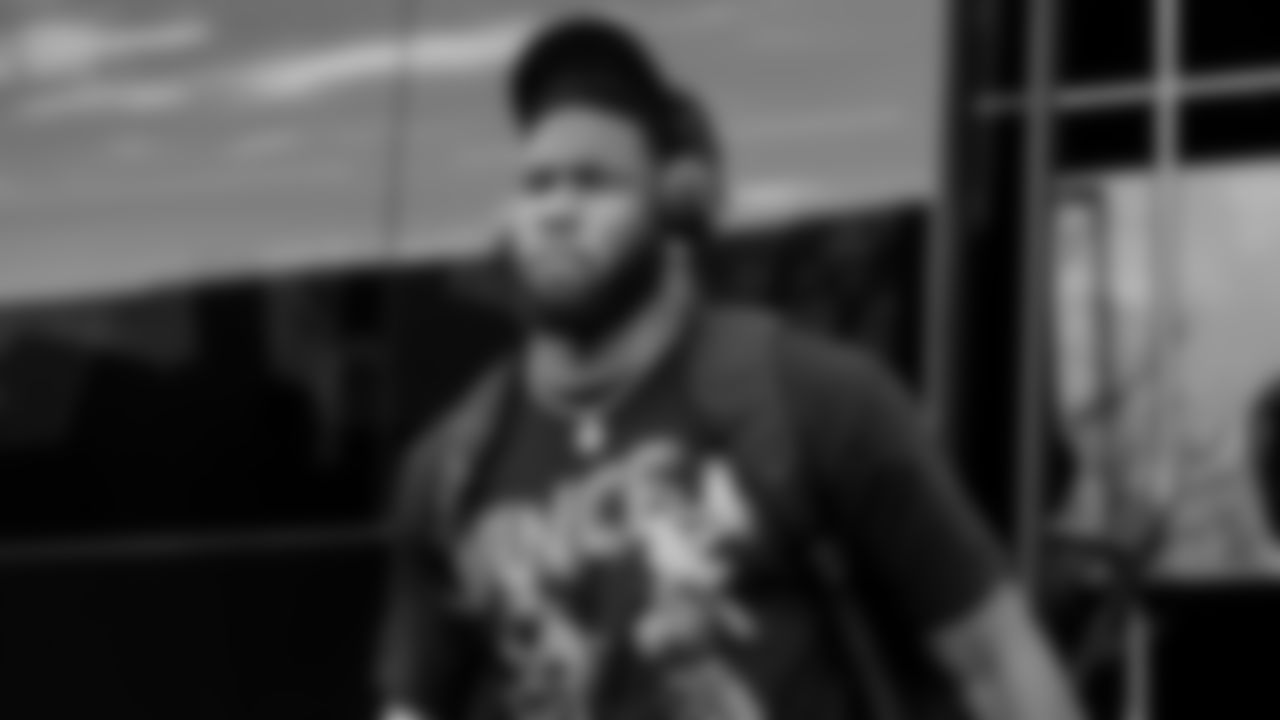

Wan'Dale Robinson (17)

Kayvon Thibodeaux (5)

Isaiah Simmons (19)
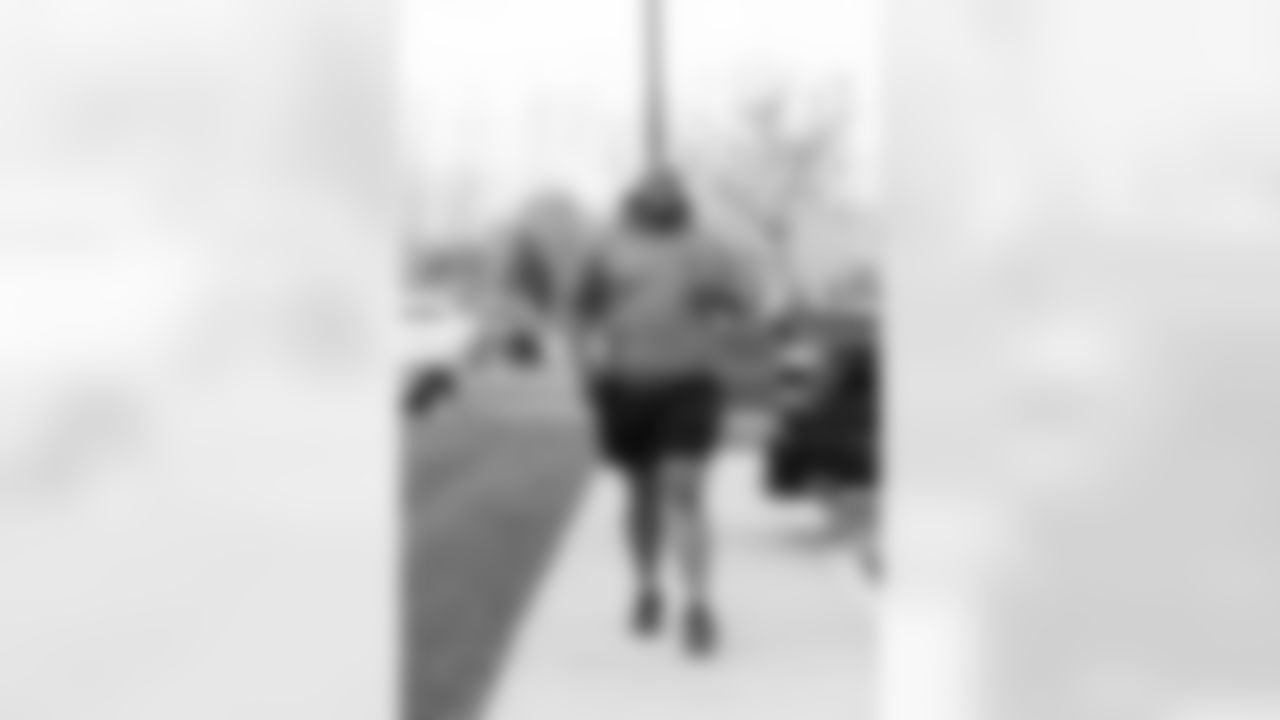
Dexter Lawrence II

Isaiah Hodgins (18)

Micah McFadden (41)

Dexter Lawrence II
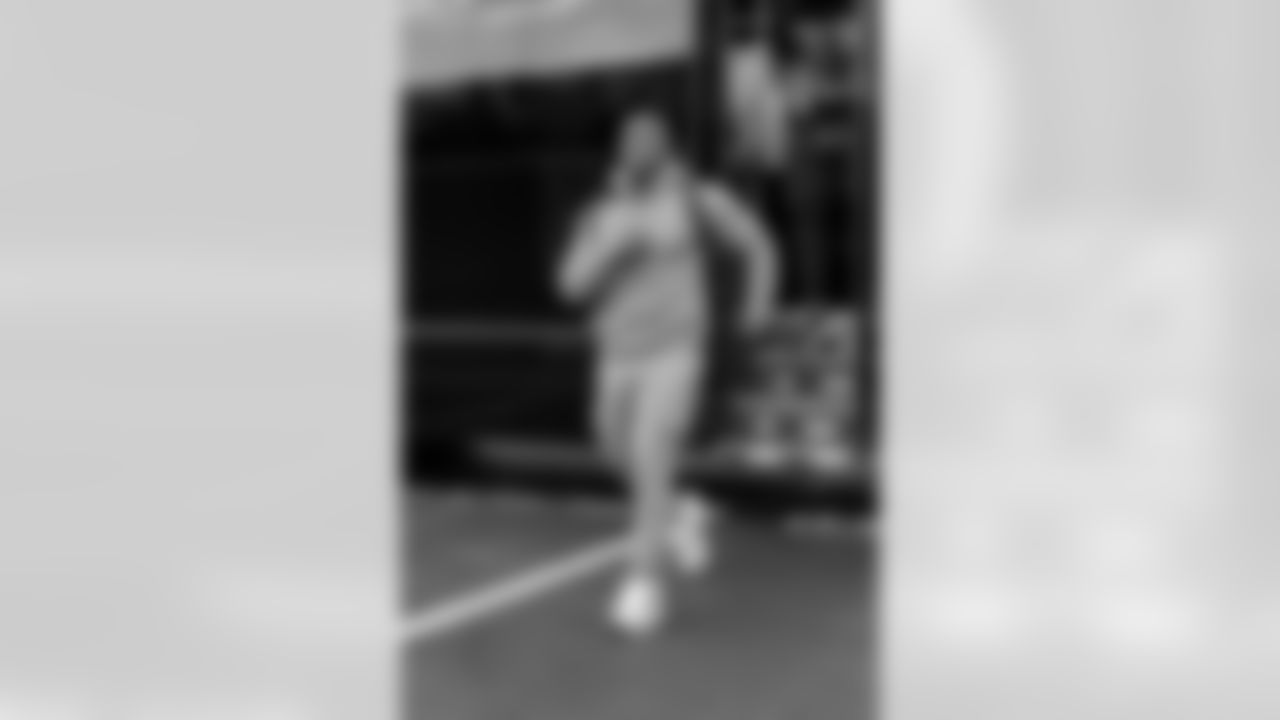
Devin Singletary (26)
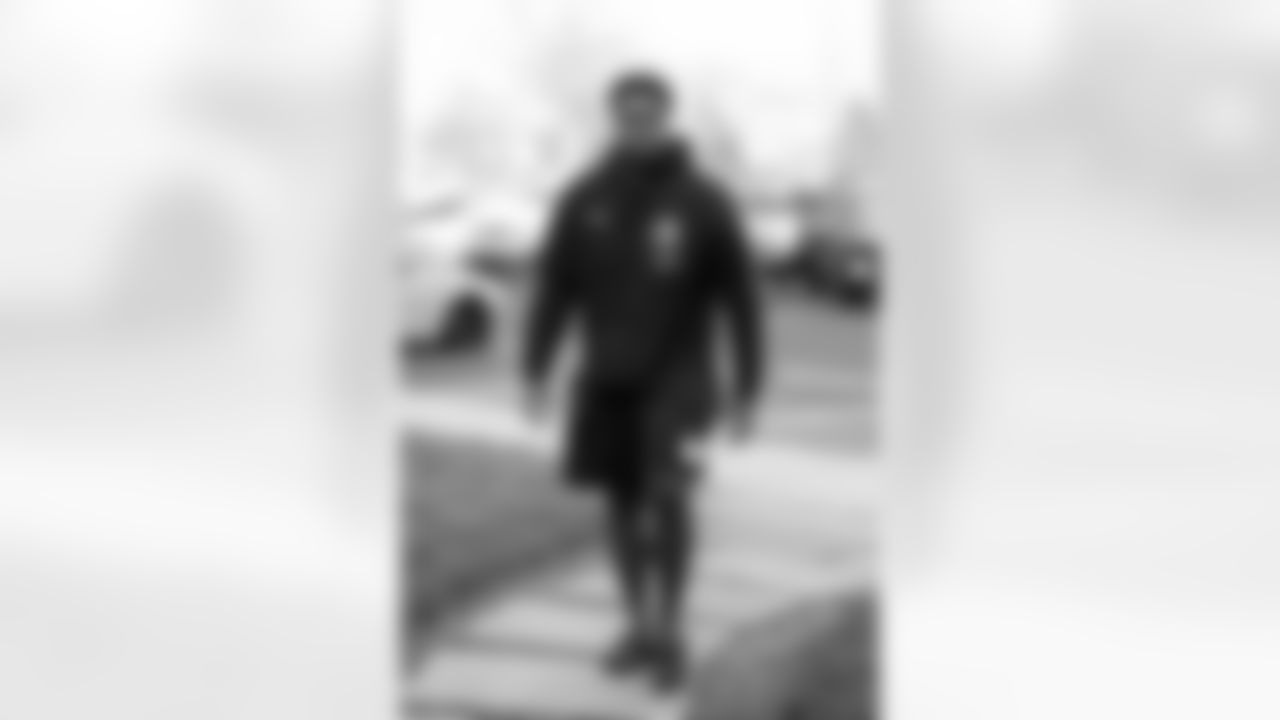

Deon Jackson (34)

Wan'Dale Robinson (17)
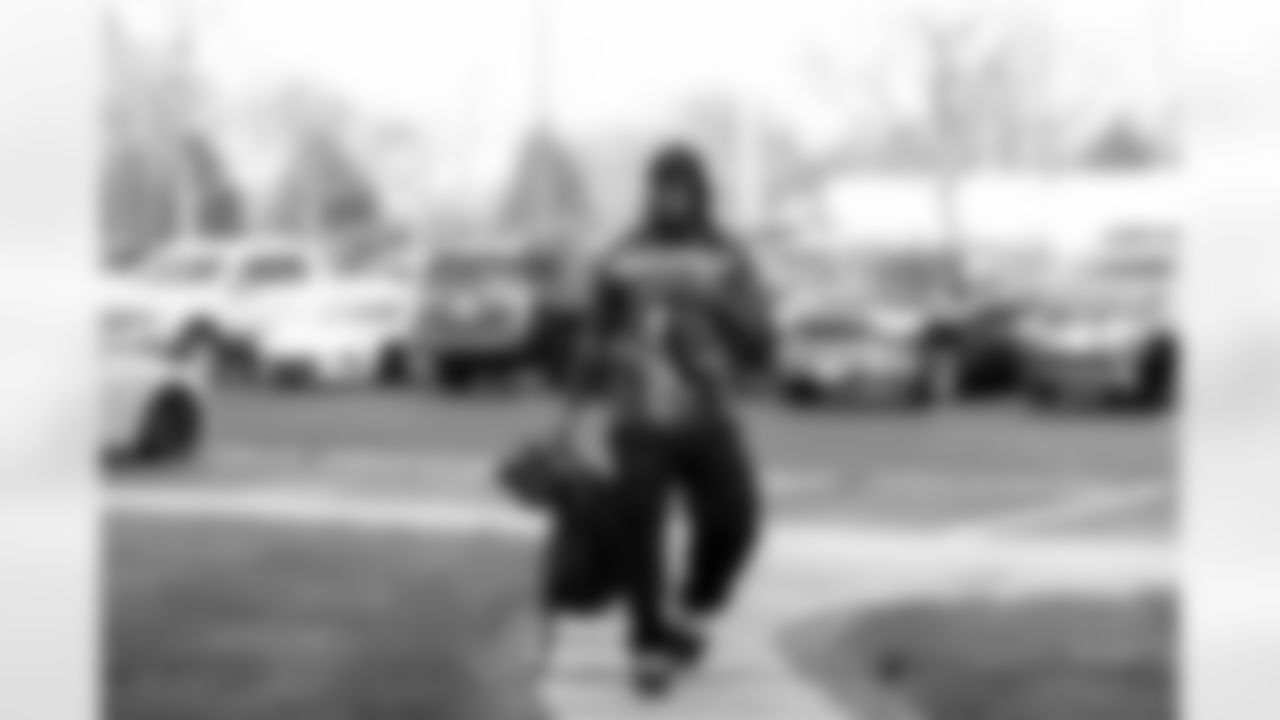
Eric Gray (20)

Deonte Banks (3)

Evan Neal
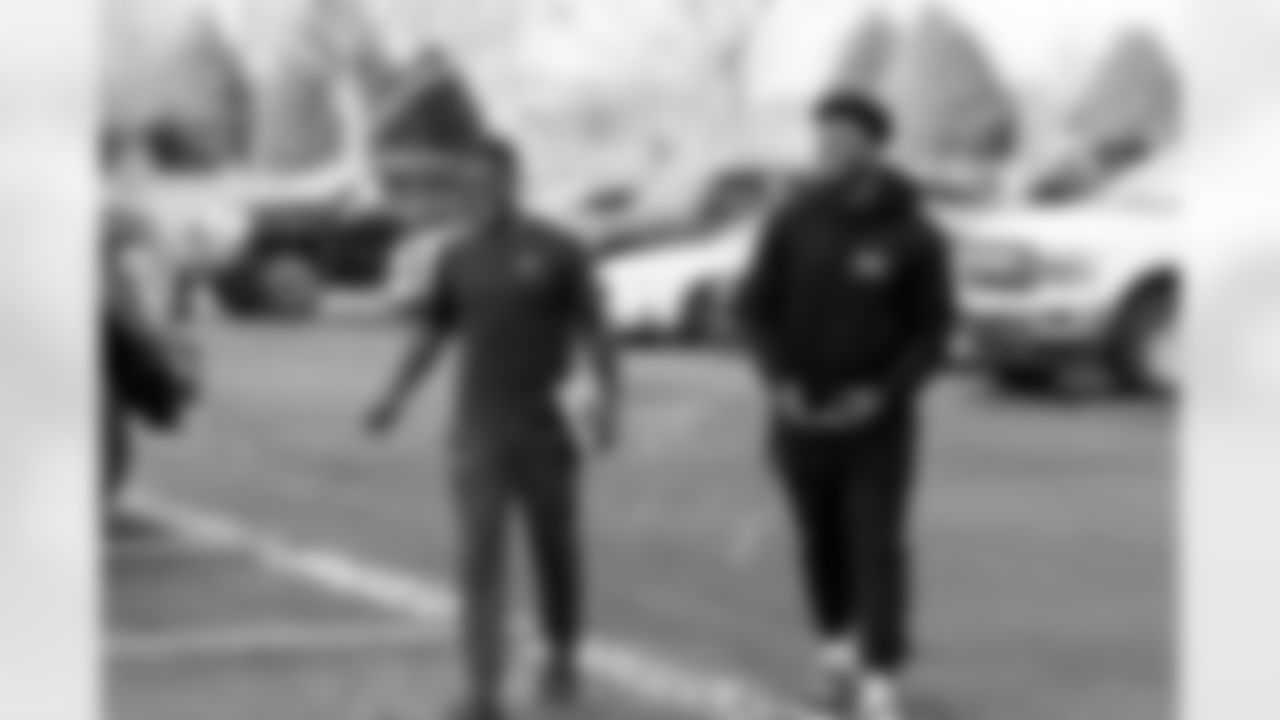
Darnay Holmes (30), Azeez Ojulari (51)

Jermaine Eluemunor (72)

Daniel Bellinger (82)

Cor'Dale Flott (28)
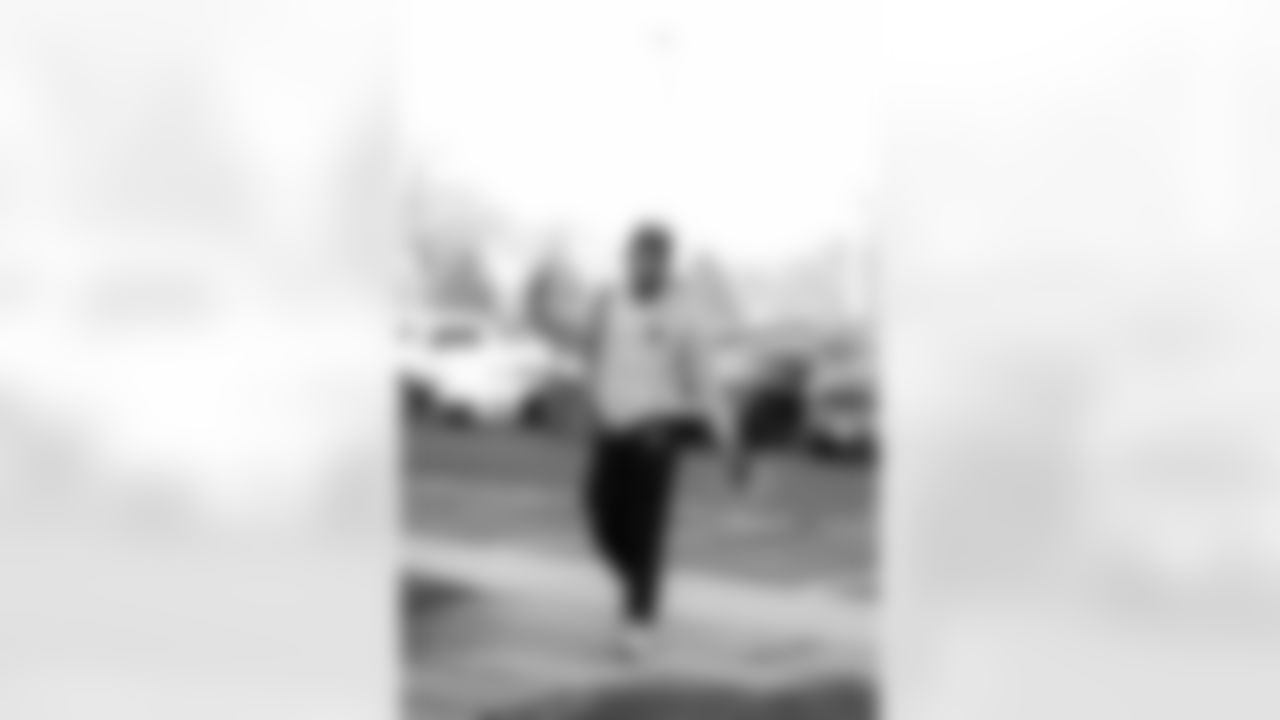
Isaiah Simmons (19)

Cor'Dale Flott (28)

Wan'Dale Robinson (17)
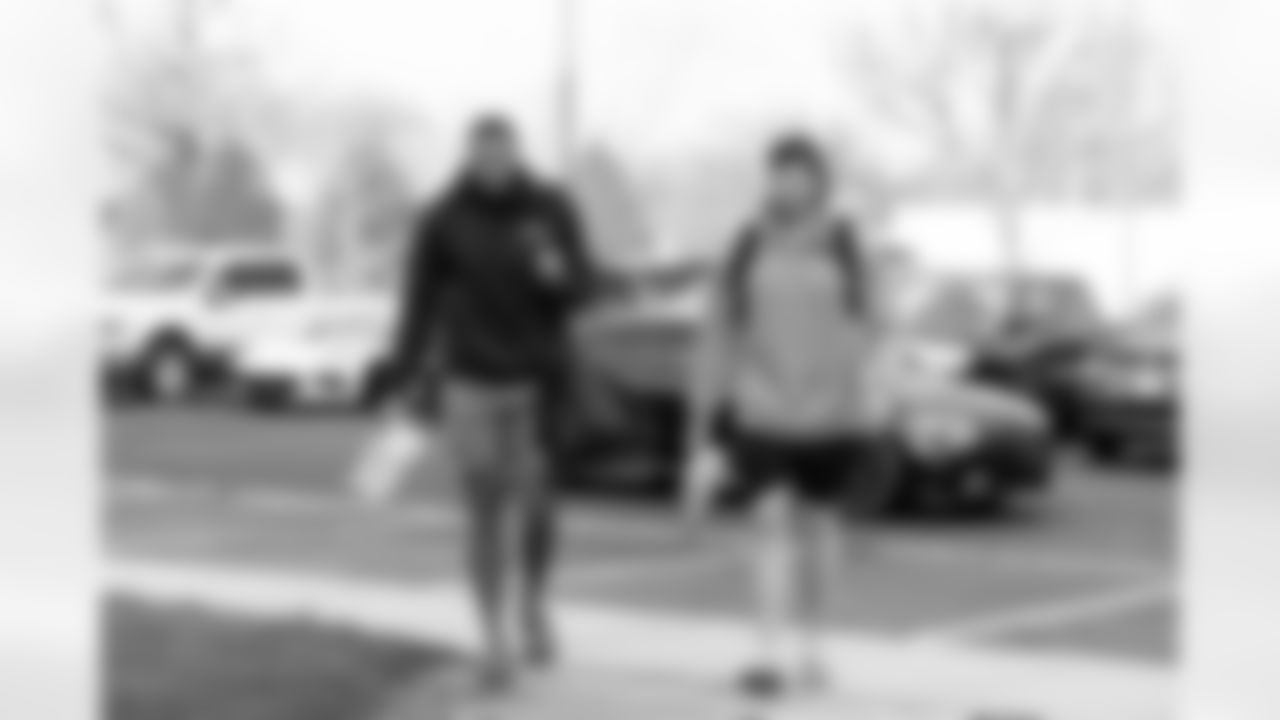
Tyree Jackson (84), Jack Stoll (89)

Jalin Hyatt (13)
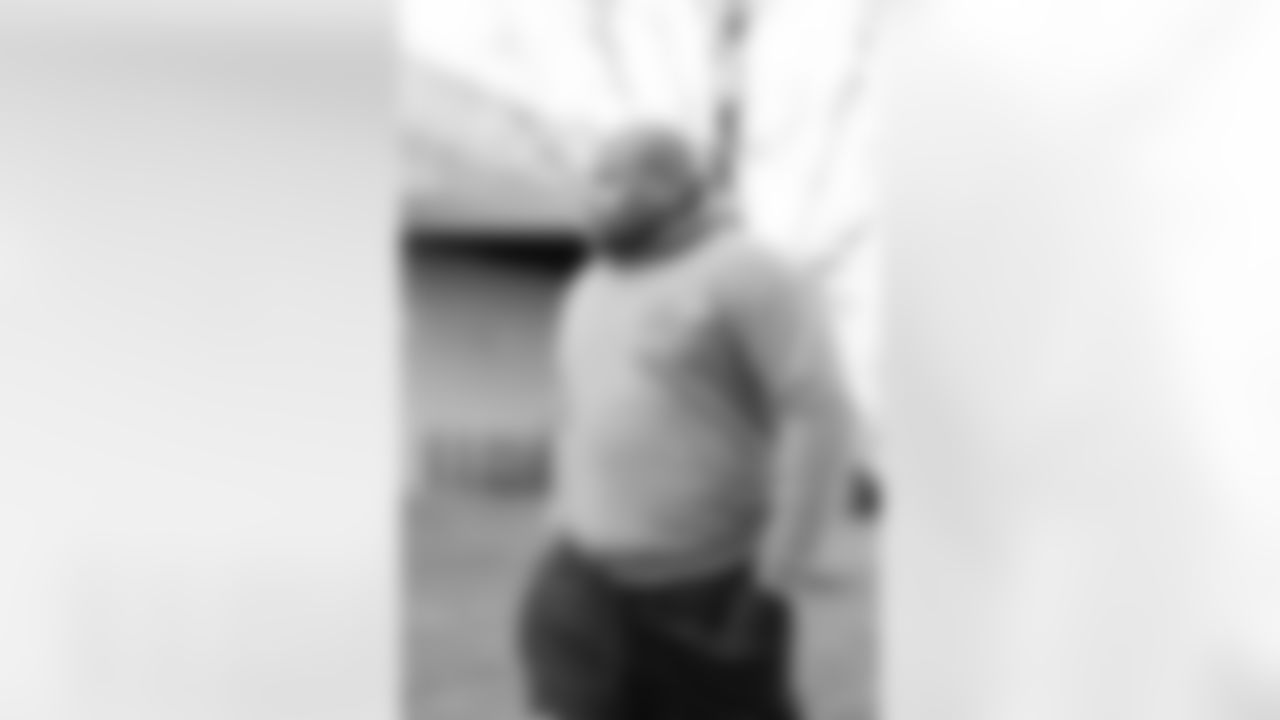
Dexter Lawrence II
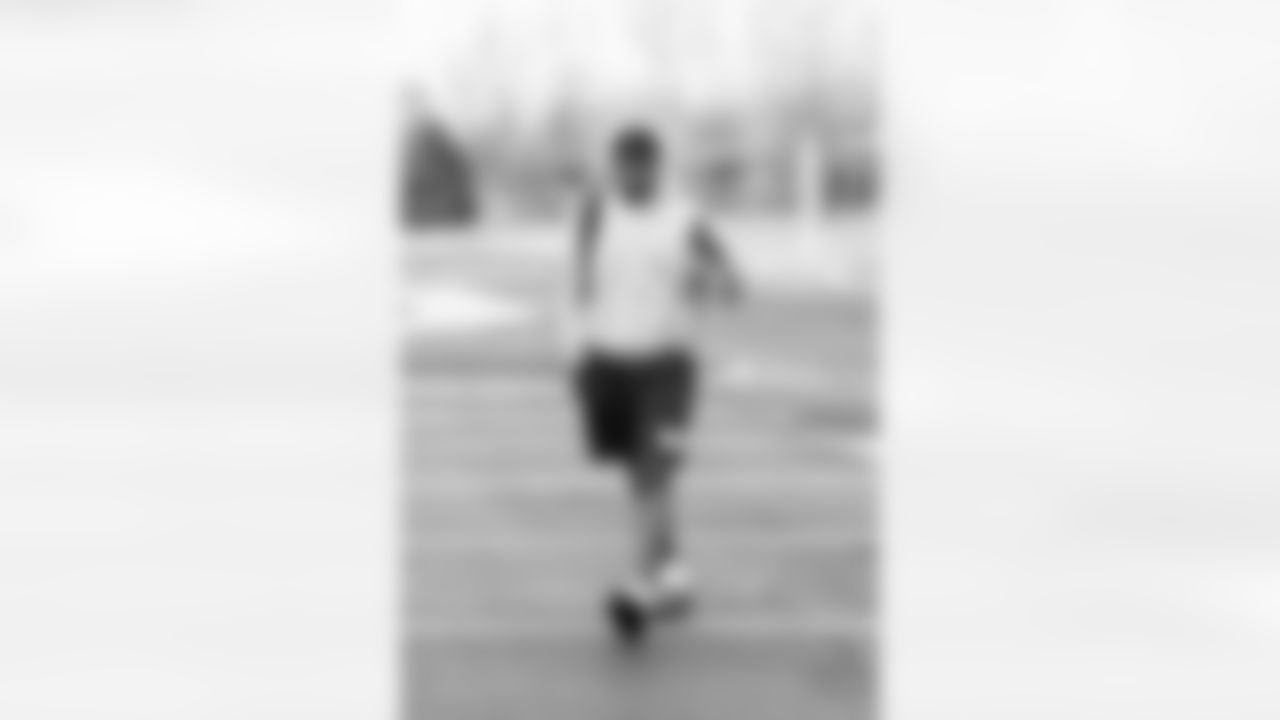
Dyontae Johnson (54)
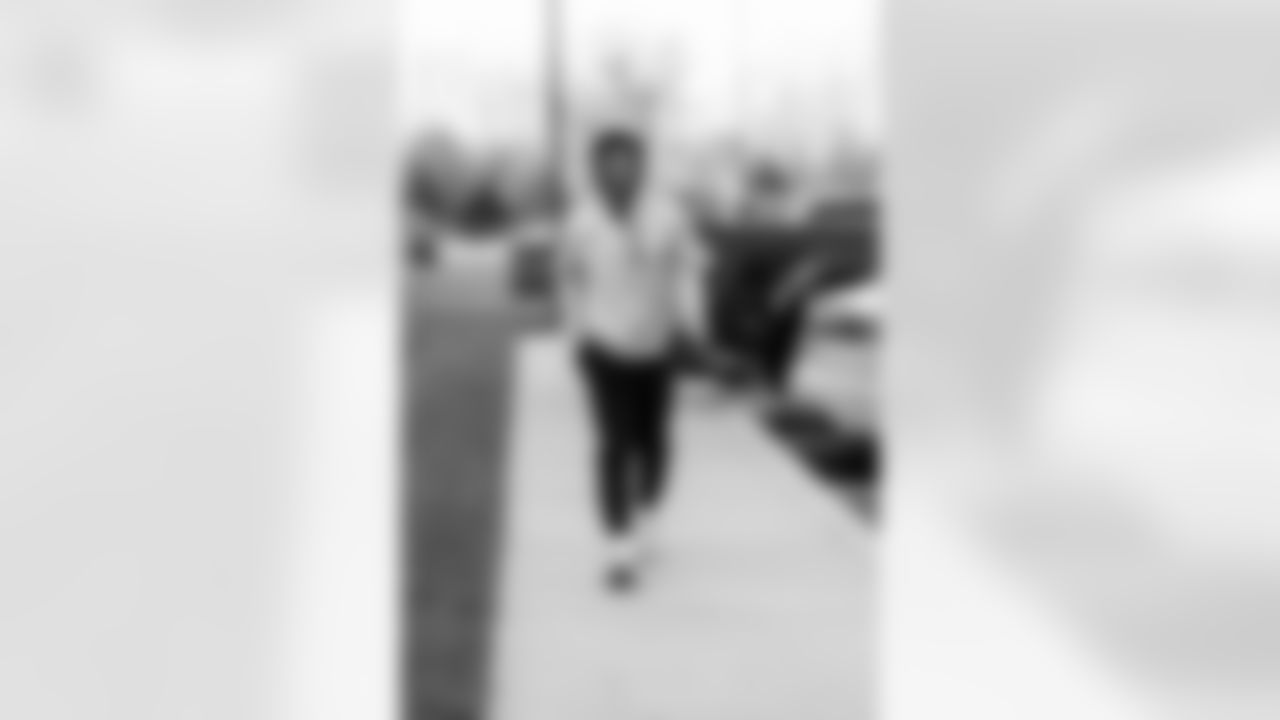
Wan'Dale Robinson (17)

Jalen Mayfield (62)
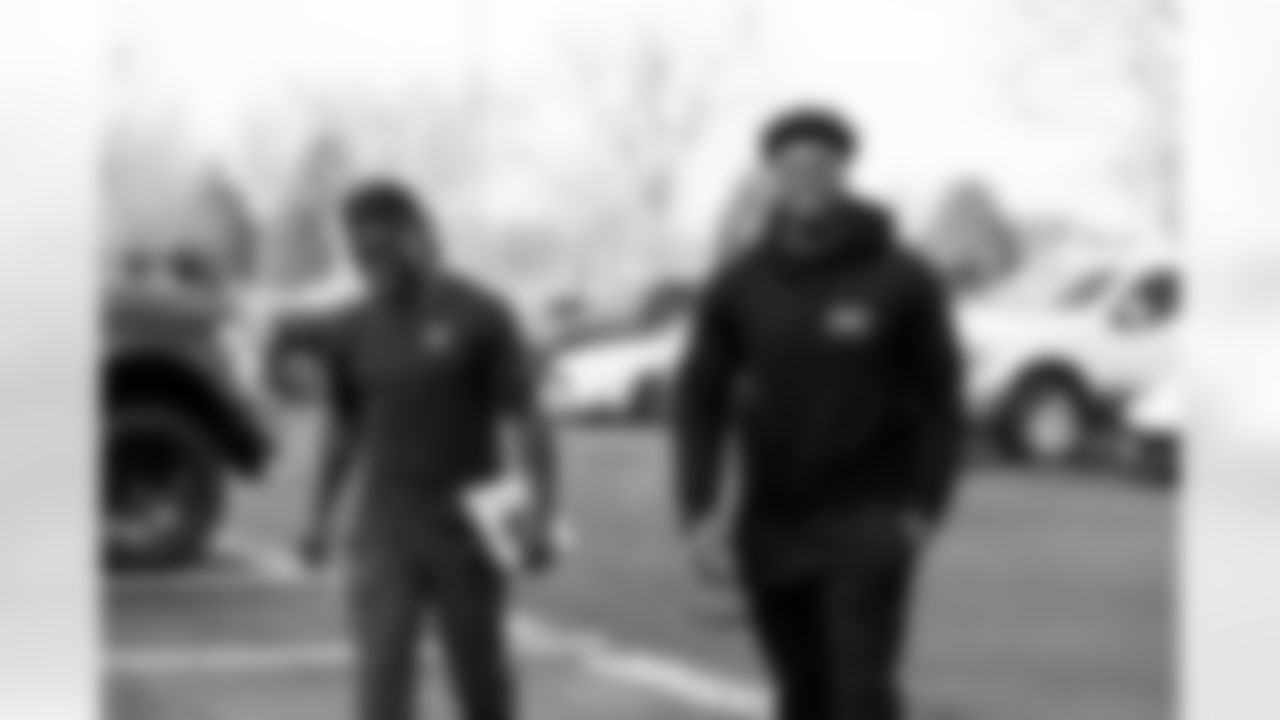
Darnay Holmes (30), Azeez Ojulari (51)
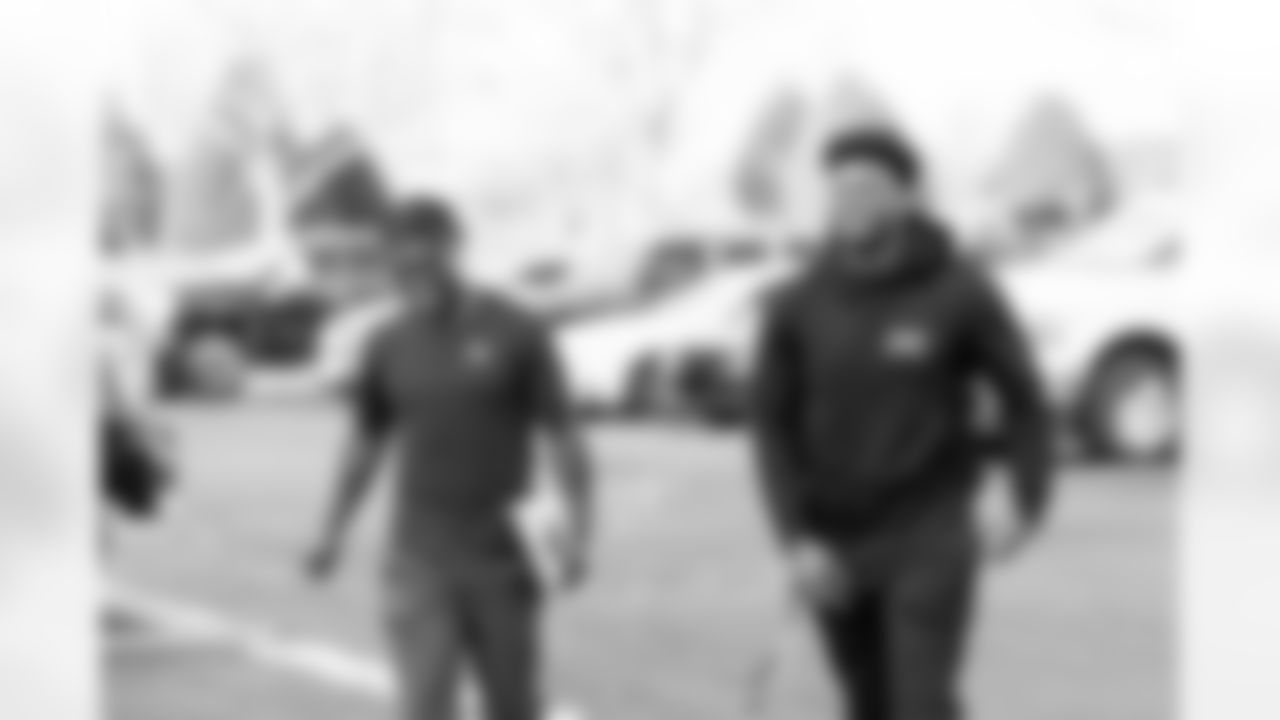
Darnay Holmes (30), Azeez Ojulari (51)

Joshua Ezeudu (75)

Jermaine Eluemunor (72)

Drew Lock (2)
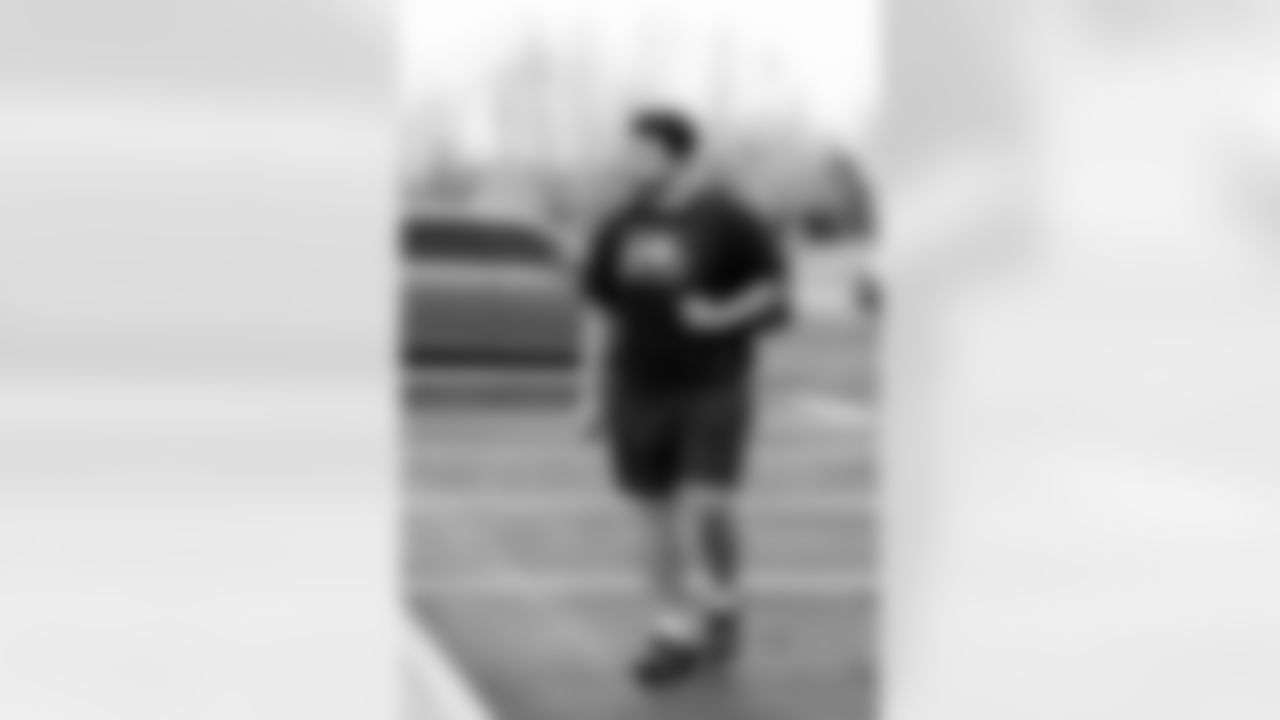
D.J. Davidson
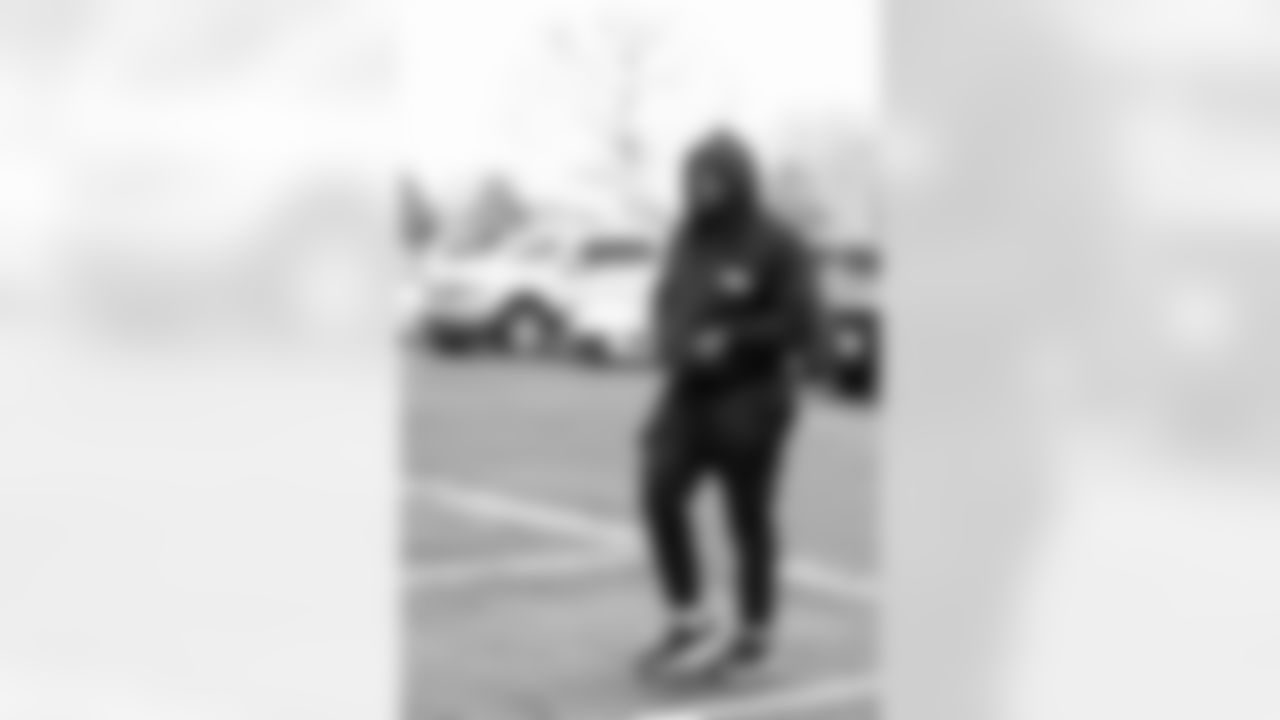
Joshua Ezeudu

Aaron Stinnie (64)

Joshua Ezeudu (75)

Joshua Miles (77)

Kayvon Thibodeaux (5)

Andrew Thomas (78)
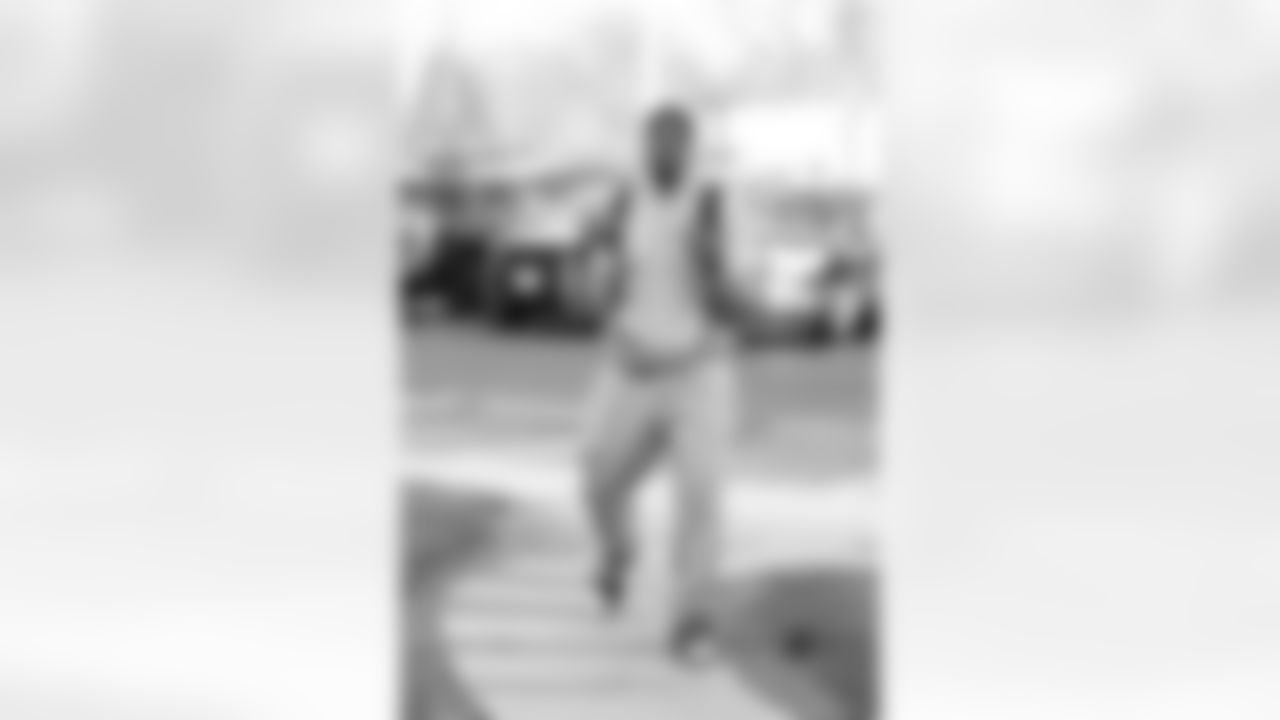
Bobby Okereke (58)

Dane Belton (24)

Jordon Riley (95)

Dane Belton (24)
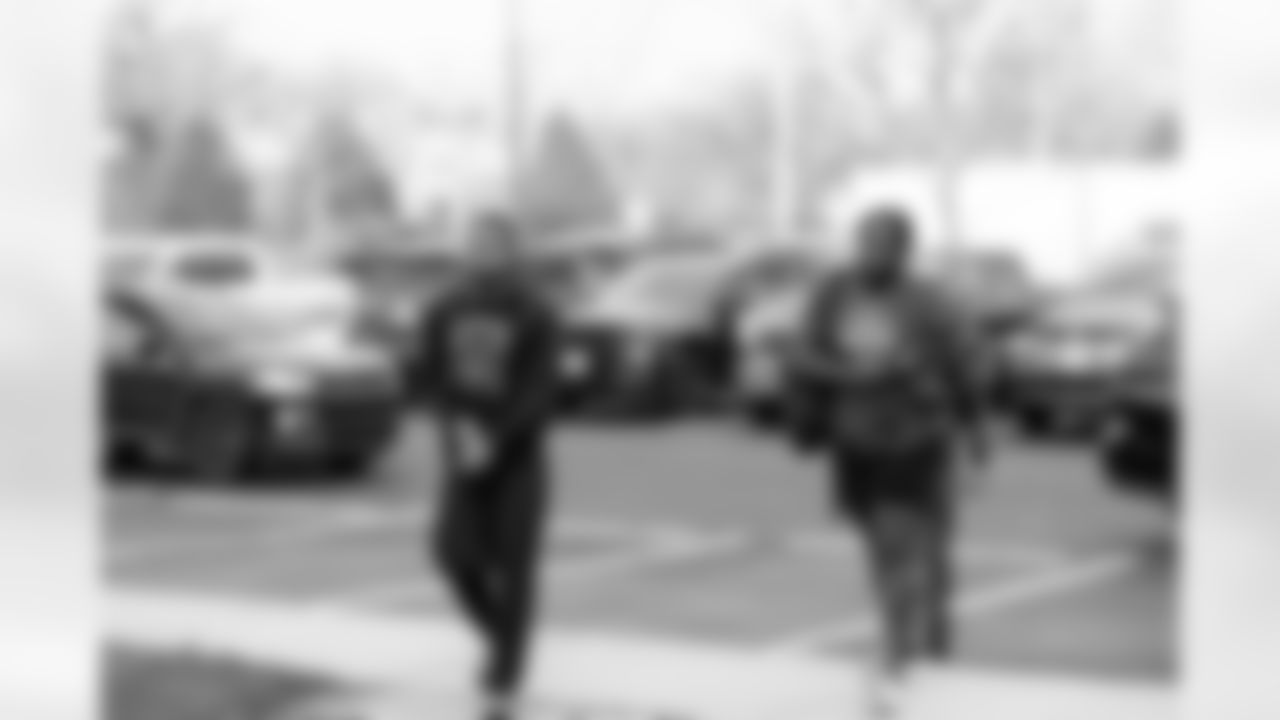
Kaleb Hayes (38)

Jason Pinnock (27)
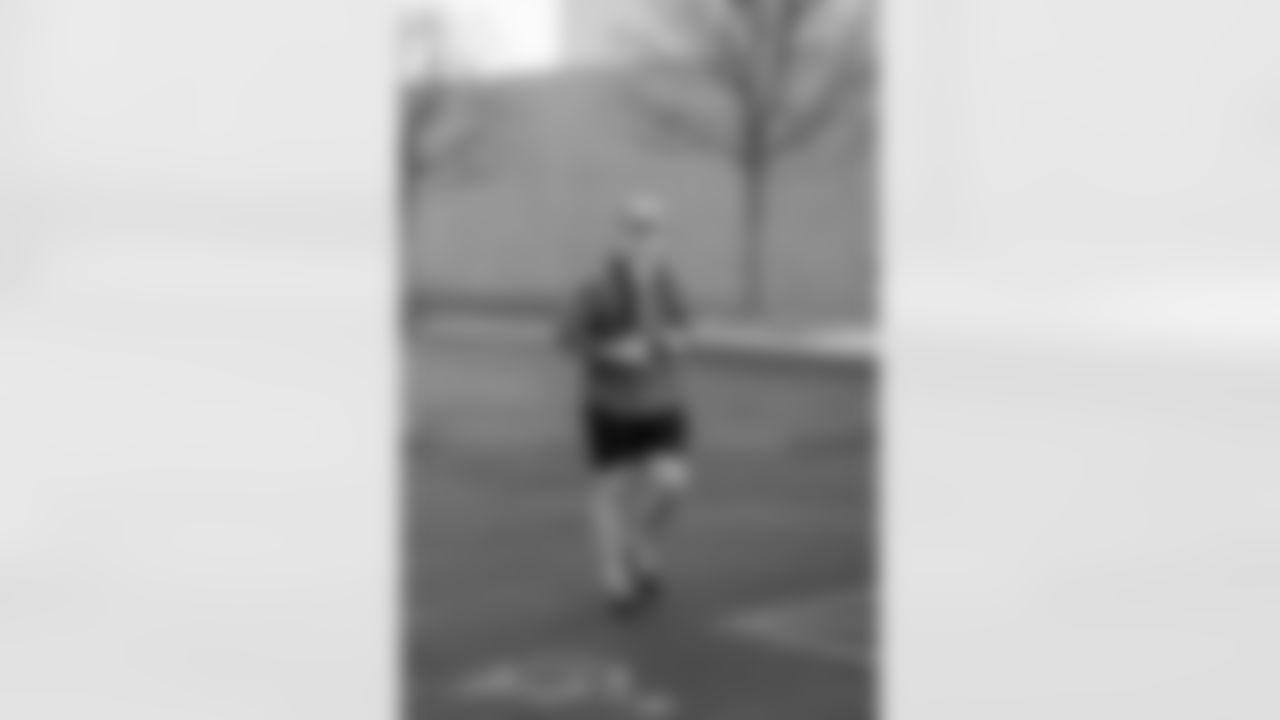
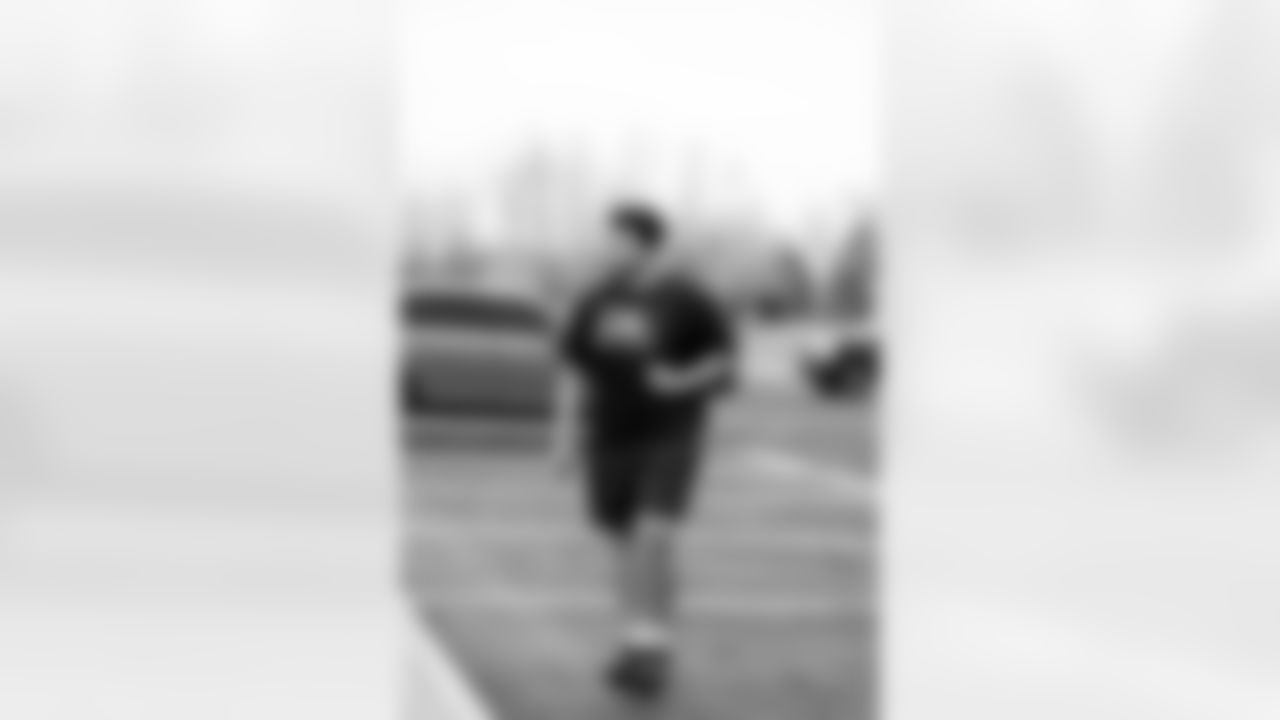
D.J. Davidson

Jason Pinnock (27)

Aaron Robinson (33)

Boogie Basham (55)

Tommy Devito

Stantley Thomas-Oliver III (36)

Boogie Basham (55)

Jon Runyan (76)

Brian Burns (0)
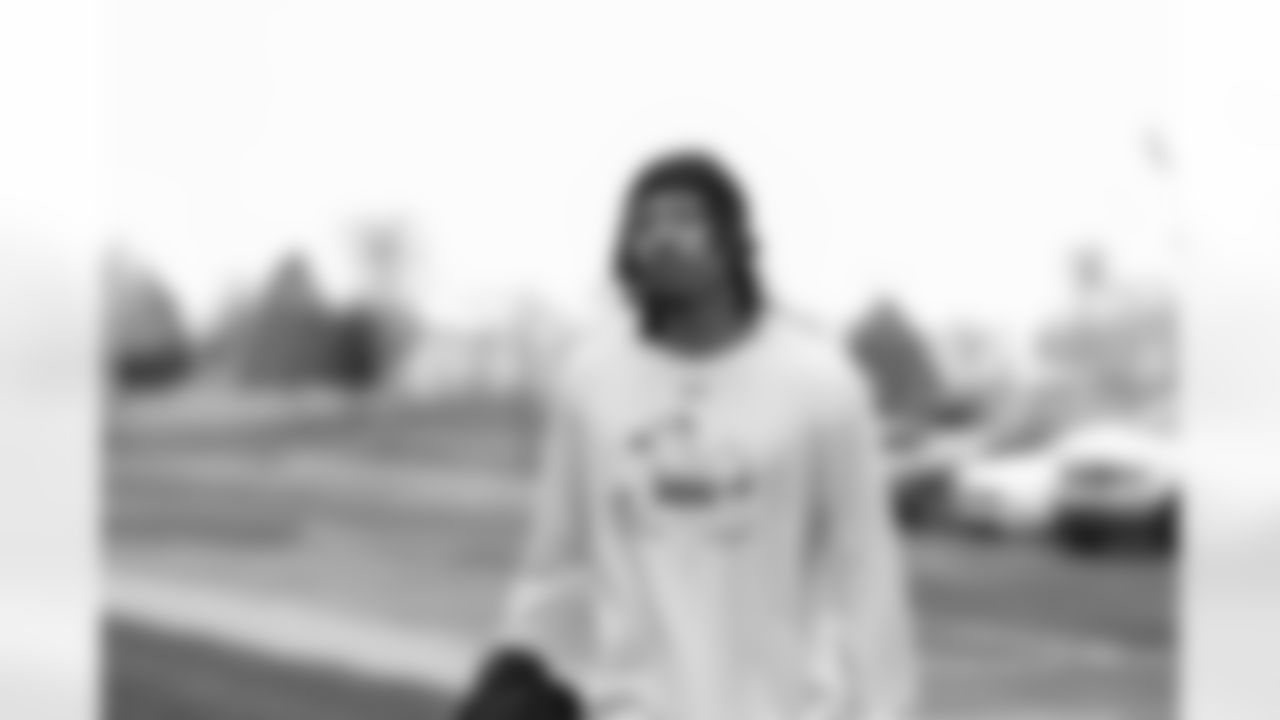
Nick McCloud (44)
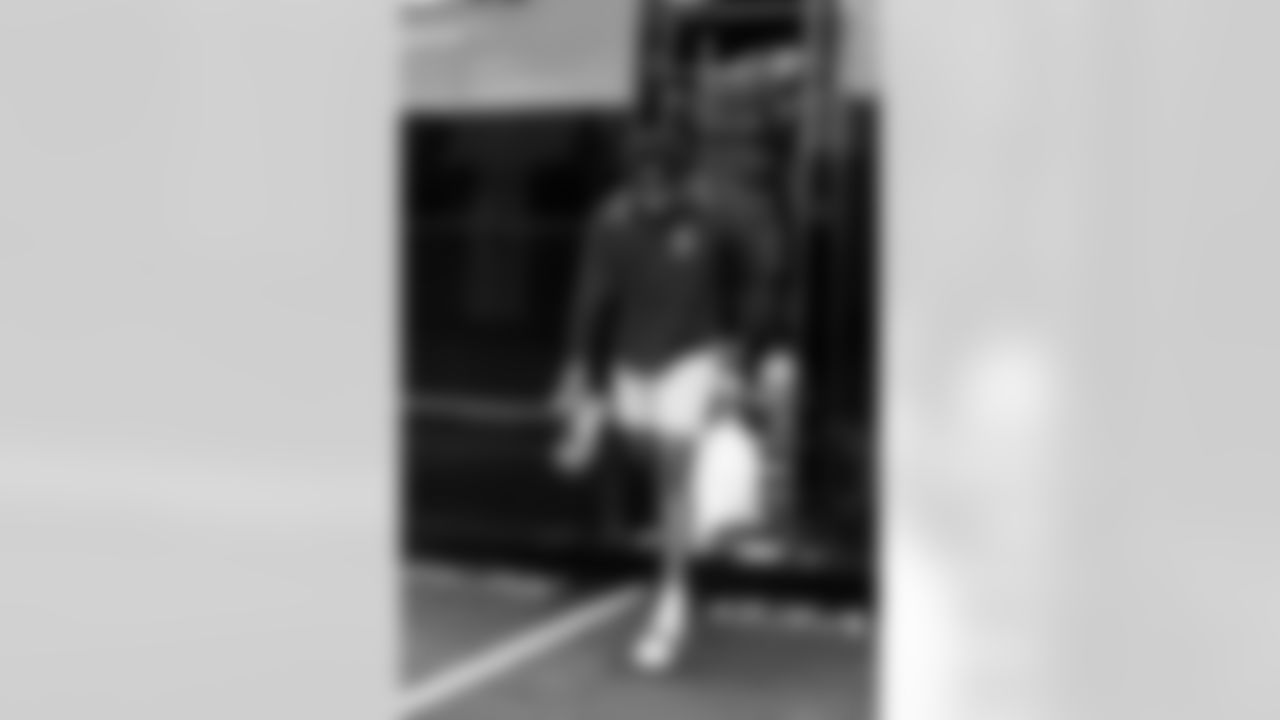
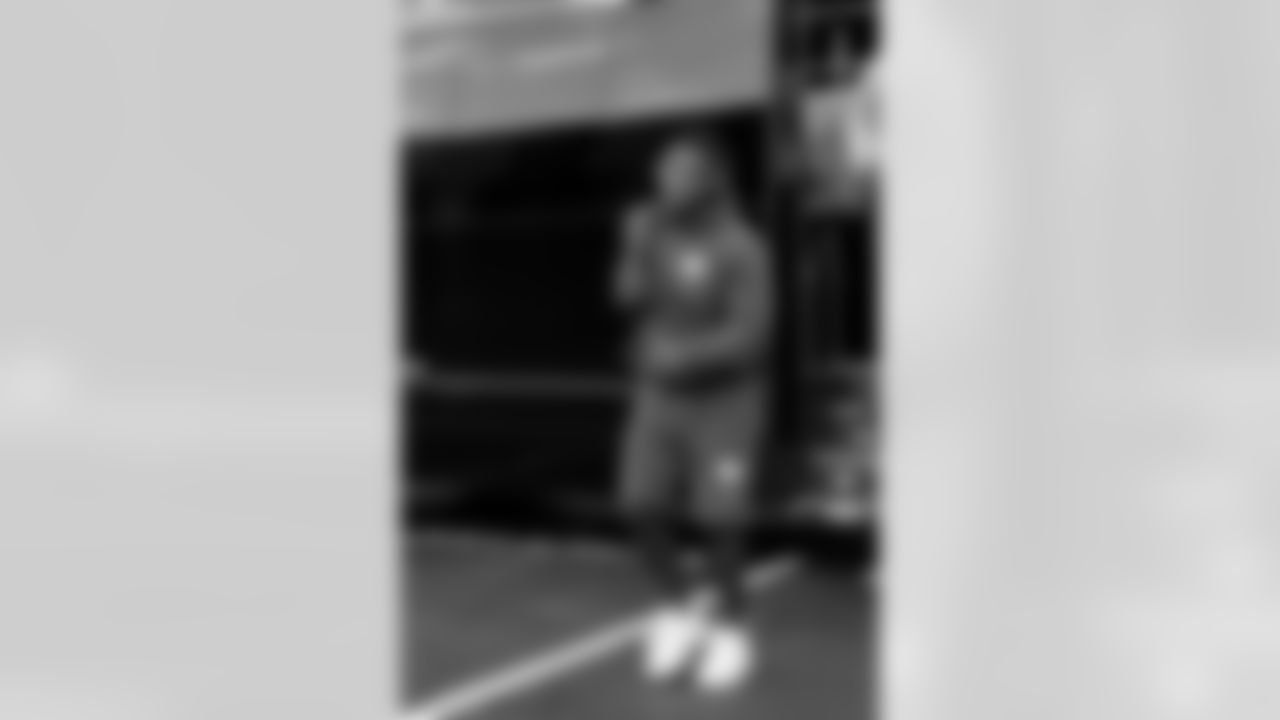
Matthew Adams
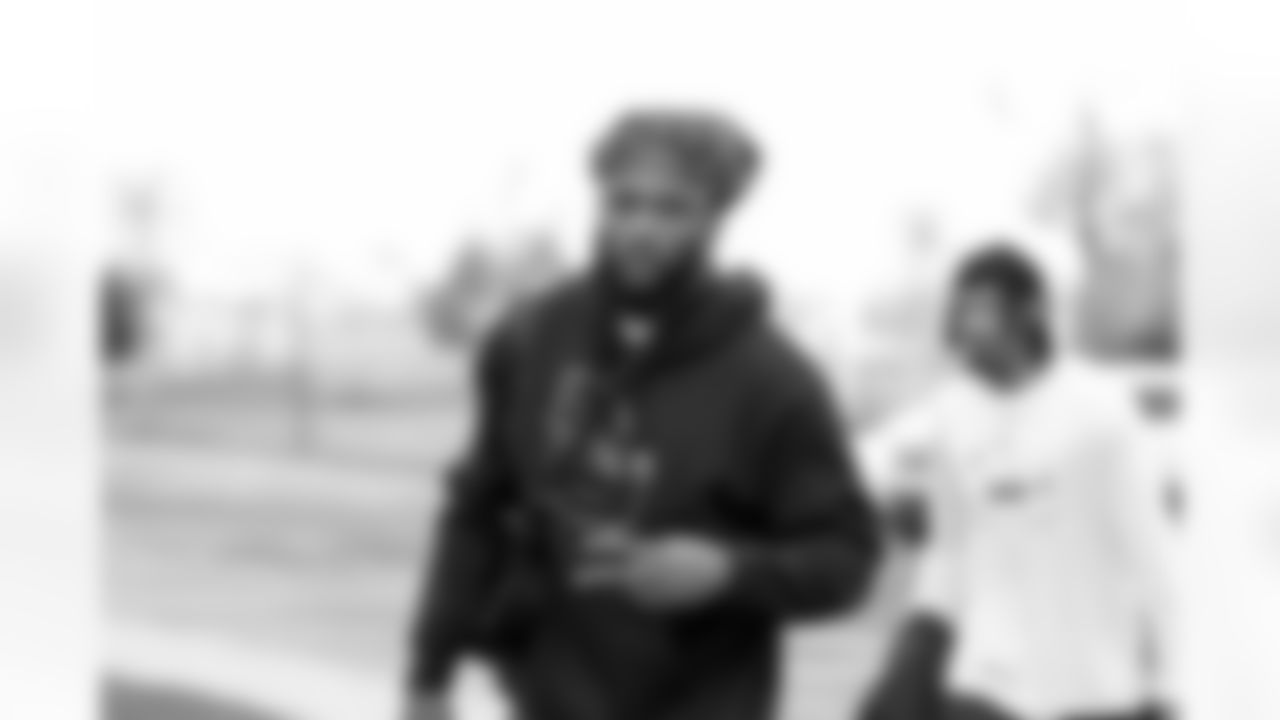
Tomon Fox (94)

Rakeem Nunez-Roches (93)

Devin Singletary (26)
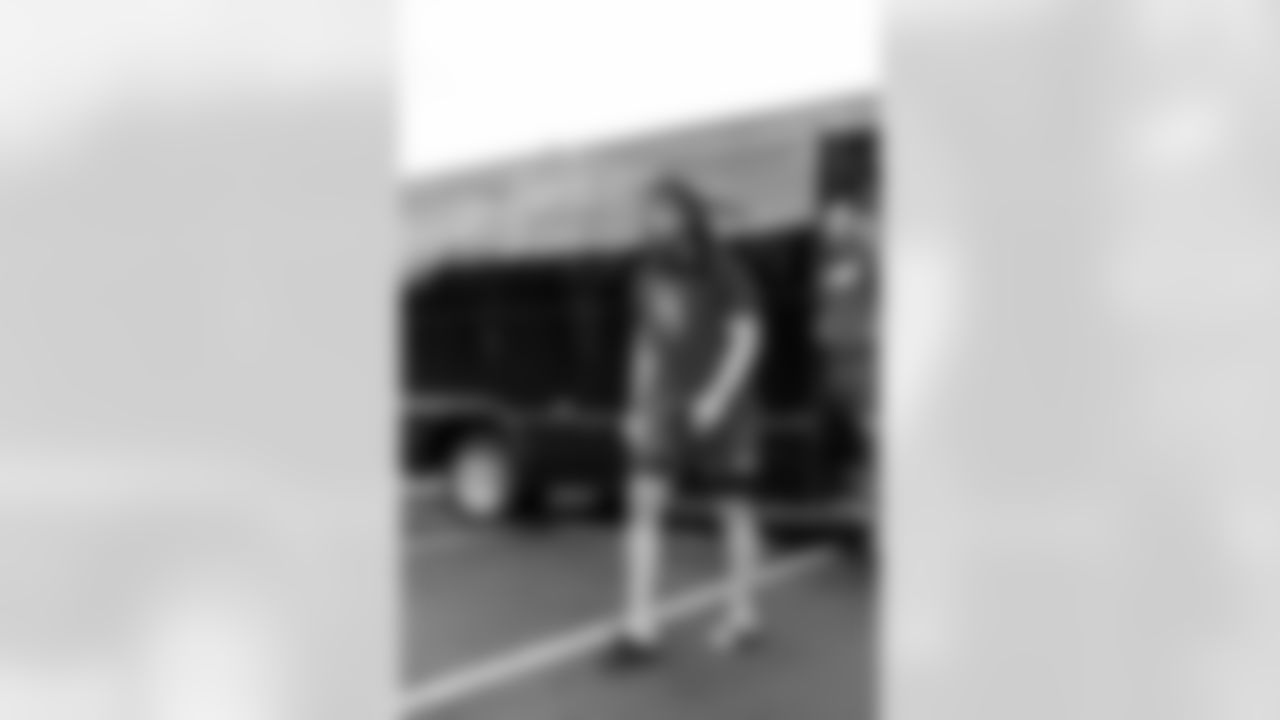
Ryder Anderson (90)
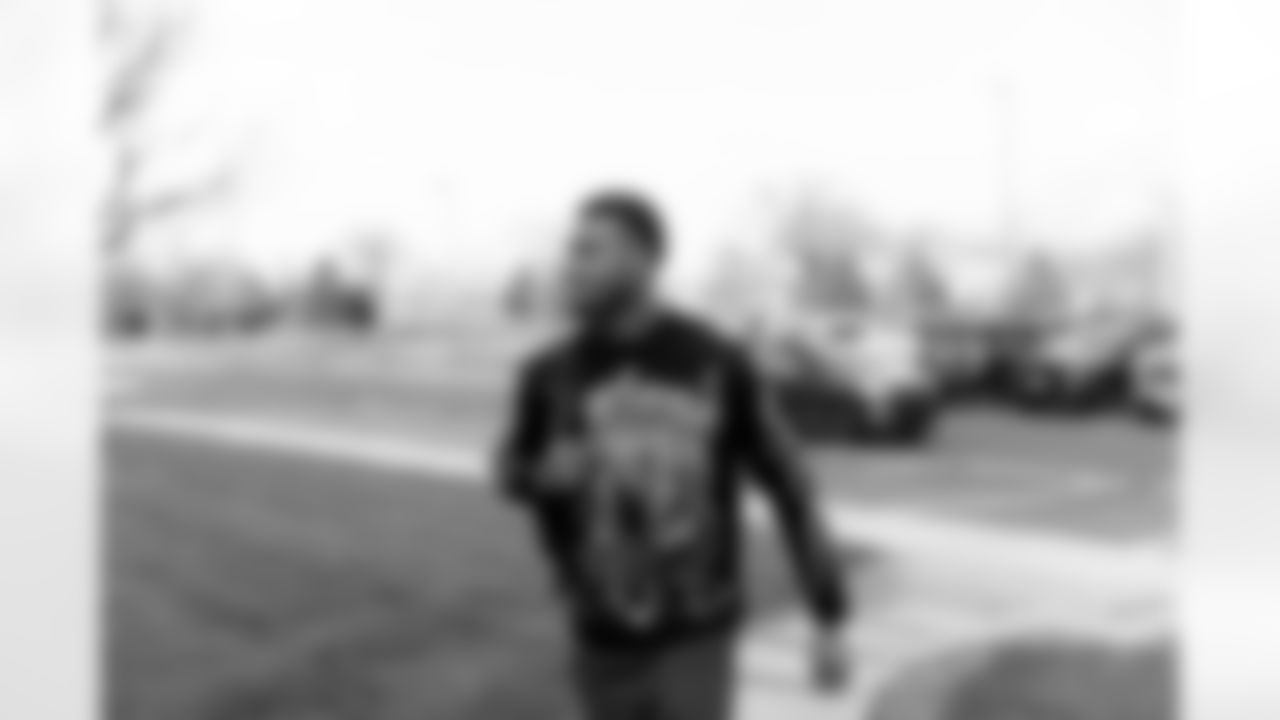
Dennis Houston (88)
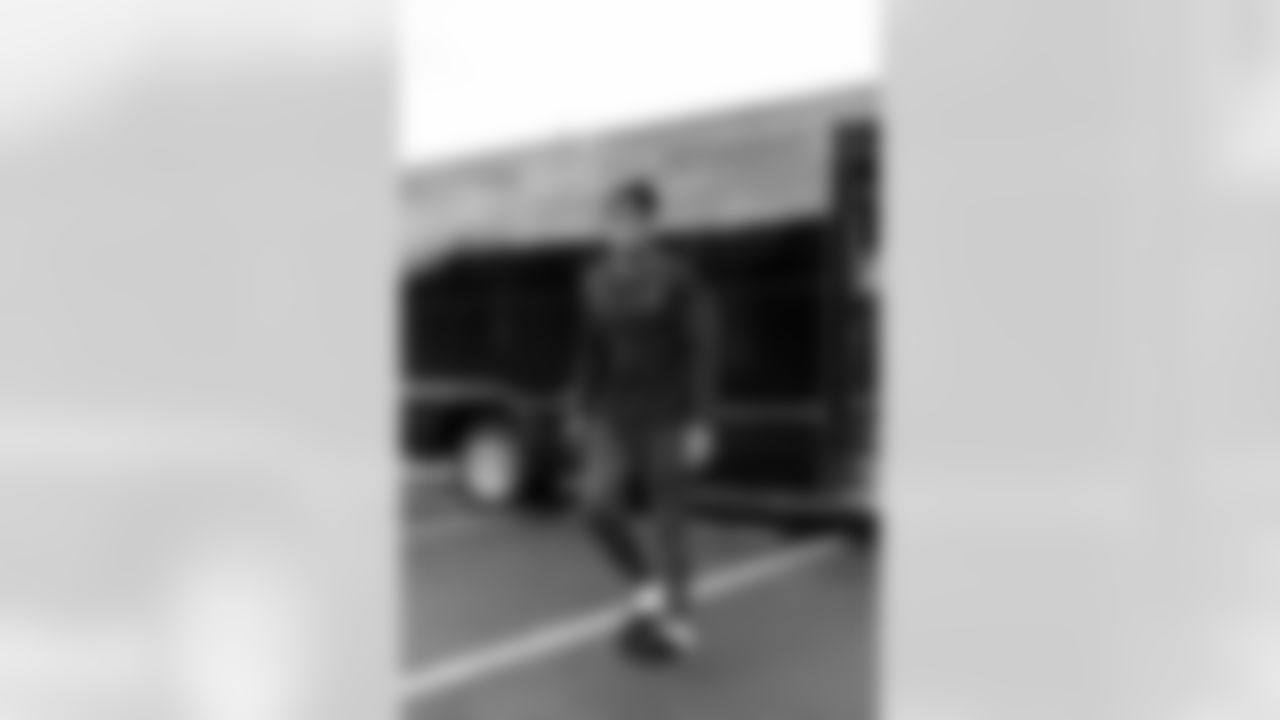
Gervarrius Owens (39)
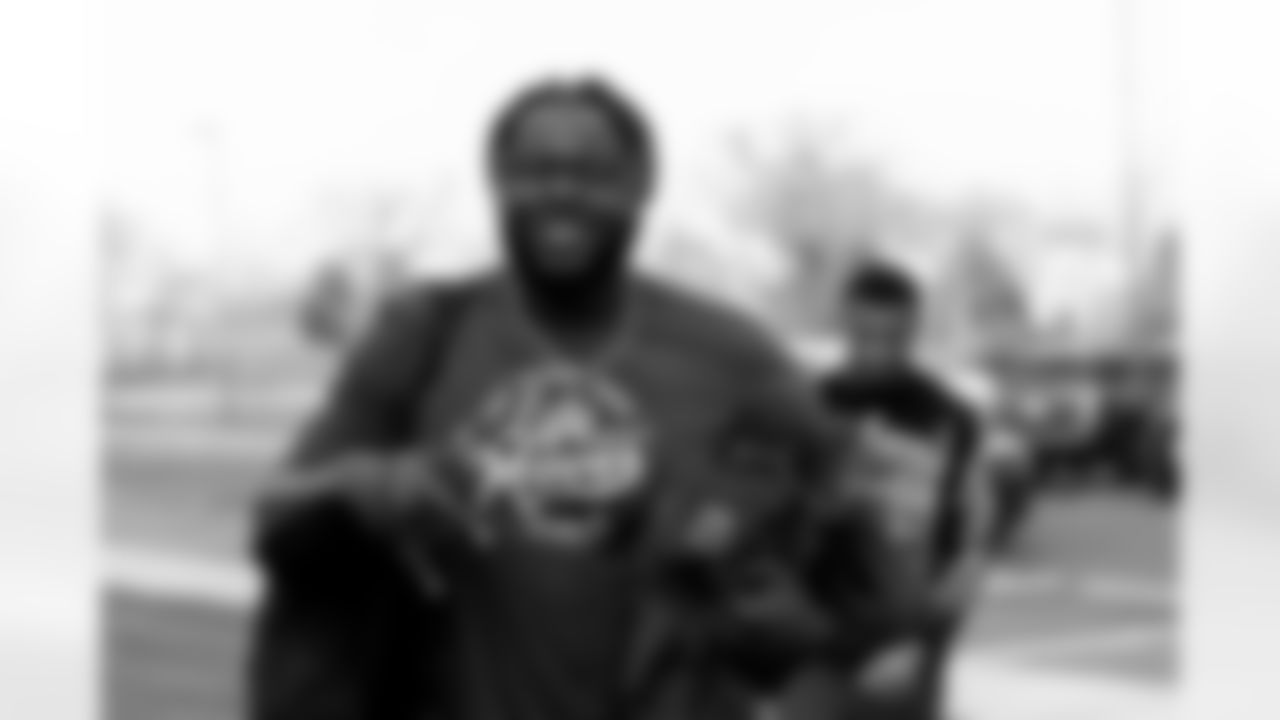
Timmy Horne (96)

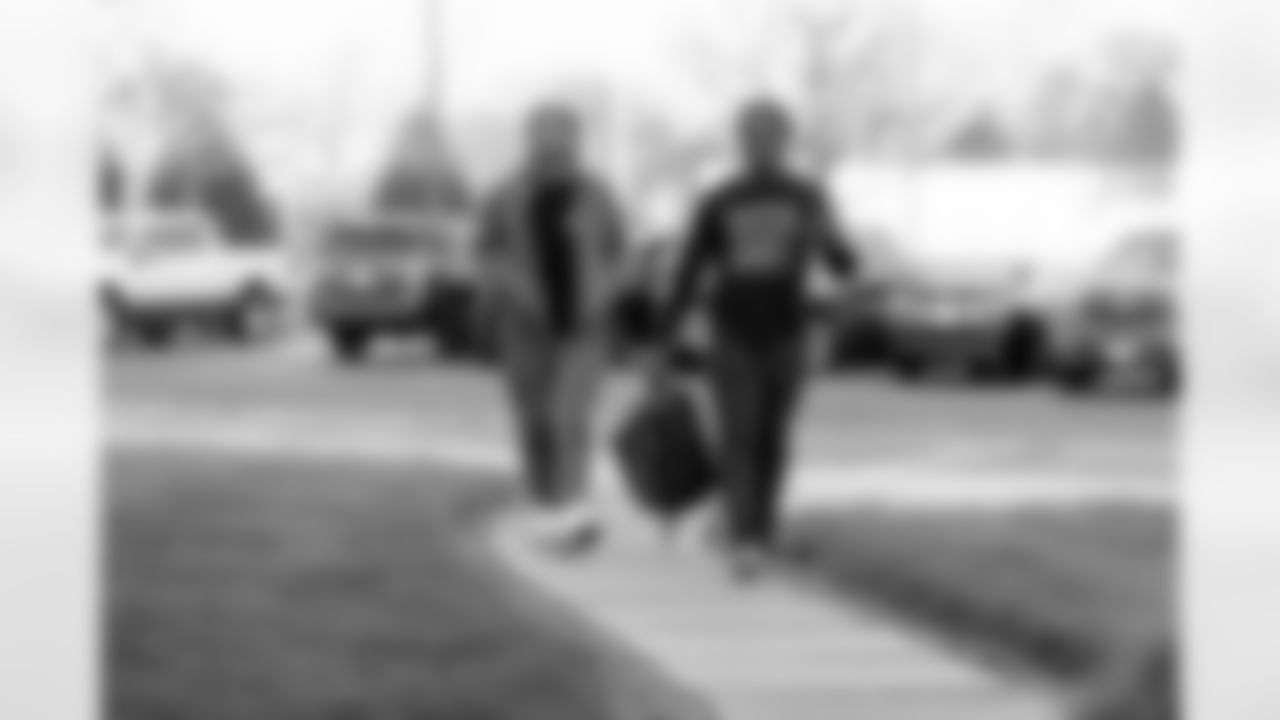
Gary Brightwell (23), Joshua Corbin (35)

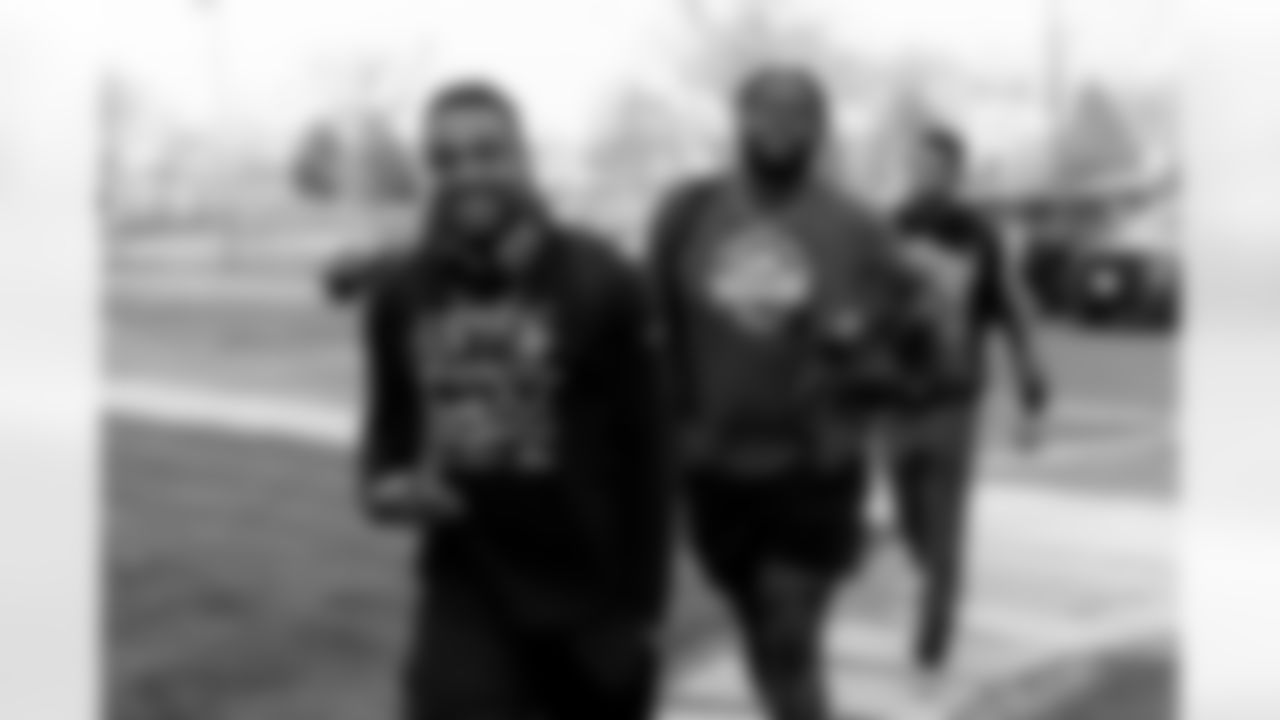
Kaleb Hayes (38)

Devin Singletary (26)

Brian Burns (0)

Isaiah Hodgins (18)
